Shows
 GHAPPcastFAQ: What Is the Difference Between CIC and IBS-C?In this video, Mary Clarke, a GI motility nurse practitioner in San Diego, addresses the difference between functional constipation and constipation-predominant Irritable Bowel Syndrome (IBS-C). Drawing from the Rome IV criteria developed by the Rome Foundation, Mary explains how functional constipation is defined by infrequent bowel movements, hard stool consistency, and difficulty evacuating—without the presence of significant pain. In contrast, IBS-C includes the same constipation symptoms plus recurrent abdominal pain related to defecation, bloating, and visceral hypersensitivity. Mary also explores the role of gut-brain interaction and how altered motility and stress can influence symptom patterns in DGBIs (Disorders of...2025-07-2903 min
GHAPPcastFAQ: What Is the Difference Between CIC and IBS-C?In this video, Mary Clarke, a GI motility nurse practitioner in San Diego, addresses the difference between functional constipation and constipation-predominant Irritable Bowel Syndrome (IBS-C). Drawing from the Rome IV criteria developed by the Rome Foundation, Mary explains how functional constipation is defined by infrequent bowel movements, hard stool consistency, and difficulty evacuating—without the presence of significant pain. In contrast, IBS-C includes the same constipation symptoms plus recurrent abdominal pain related to defecation, bloating, and visceral hypersensitivity. Mary also explores the role of gut-brain interaction and how altered motility and stress can influence symptom patterns in DGBIs (Disorders of...2025-07-2903 min GHAPPcastGHAPPcast: Lifestyle and Nutrition Interventions for ConstipationIn this episode of the GHAPPcast, Kate Scarlata, RDN, a nationally recognized GI-focused dietitian, joins Amy Ladewski, PA-C, from Northwestern Medicine, to explore personalized, evidence-based dietary strategies for patients with Irritable Bowel Syndrome with Constipation (IBS-C). Using a real-world case study approach, they discuss the impact of fiber choice, the role of psyllium versus fermentable fibers like wheat dextrin and inulin, and how over-supplementation can worsen IBS symptoms. Kate provides practical, patient-friendly tips on how to reduce symptom-triggering foods without overwhelming dietary restrictions, highlighting how to reintroduce safe, low-FODMAP options without using the term "FODMAP." The episode also compares...2025-07-2433 min
GHAPPcastGHAPPcast: Lifestyle and Nutrition Interventions for ConstipationIn this episode of the GHAPPcast, Kate Scarlata, RDN, a nationally recognized GI-focused dietitian, joins Amy Ladewski, PA-C, from Northwestern Medicine, to explore personalized, evidence-based dietary strategies for patients with Irritable Bowel Syndrome with Constipation (IBS-C). Using a real-world case study approach, they discuss the impact of fiber choice, the role of psyllium versus fermentable fibers like wheat dextrin and inulin, and how over-supplementation can worsen IBS symptoms. Kate provides practical, patient-friendly tips on how to reduce symptom-triggering foods without overwhelming dietary restrictions, highlighting how to reintroduce safe, low-FODMAP options without using the term "FODMAP." The episode also compares...2025-07-2433 min GHAPPcastAPP Insight: Discussing Exercise as a Complement to IBS-C TreatmentIn this episode, Mary Clarke, a GI motility nurse practitioner based in San Diego, discusses the powerful role of complementary and alternative therapies—especially exercise—in managing Irritable Bowel Syndrome (IBS). With a focus on IBS-C (constipation-predominant IBS), Mary explains how regular physical activity can improve gastrointestinal motility, reduce abdominal pain and bloating, support emotional well-being by lowering stress levels, and positively influence the gut microbiome. She reviews different forms of aerobic and low-impact exercise, including walking, cycling, swimming, and yoga, and provides practical strategies for patients at all activity levels to build sustainable routines. Mary also highlights the phys...2025-07-2205 min
GHAPPcastAPP Insight: Discussing Exercise as a Complement to IBS-C TreatmentIn this episode, Mary Clarke, a GI motility nurse practitioner based in San Diego, discusses the powerful role of complementary and alternative therapies—especially exercise—in managing Irritable Bowel Syndrome (IBS). With a focus on IBS-C (constipation-predominant IBS), Mary explains how regular physical activity can improve gastrointestinal motility, reduce abdominal pain and bloating, support emotional well-being by lowering stress levels, and positively influence the gut microbiome. She reviews different forms of aerobic and low-impact exercise, including walking, cycling, swimming, and yoga, and provides practical strategies for patients at all activity levels to build sustainable routines. Mary also highlights the phys...2025-07-2205 min GHAPPcastGHAPPcast: Mental Health Issues and Symptoms Related to IBS-CIn this insightful episode, GI nurse practitioners Mary Clarke, Kristina Skarbinski, and Monica Nandwani explore the powerful connection between mental health and irritable bowel syndrome (IBS)—with a focus on IBS-C. The discussion highlights how stress, poor sleep, and emotional health can significantly impact gut function and symptom severity. Drawing on the updated 2024 Real-World IBS Survey, the team shares data showing how IBS affects quality of life, from daily discomfort to dietary restrictions and social withdrawal. Mary reviews how stress alters gut motility and gut-brain signaling, while Christina outlines pharmacologic strategies like neuromodulators (e.g., TCAs, SNRIs, SSRIs) and be...2025-07-1721 min
GHAPPcastGHAPPcast: Mental Health Issues and Symptoms Related to IBS-CIn this insightful episode, GI nurse practitioners Mary Clarke, Kristina Skarbinski, and Monica Nandwani explore the powerful connection between mental health and irritable bowel syndrome (IBS)—with a focus on IBS-C. The discussion highlights how stress, poor sleep, and emotional health can significantly impact gut function and symptom severity. Drawing on the updated 2024 Real-World IBS Survey, the team shares data showing how IBS affects quality of life, from daily discomfort to dietary restrictions and social withdrawal. Mary reviews how stress alters gut motility and gut-brain signaling, while Christina outlines pharmacologic strategies like neuromodulators (e.g., TCAs, SNRIs, SSRIs) and be...2025-07-1721 min GHAPPcastFAQ: What Is the Significance of Alarm Symptoms Including Pathophysiology?In this episode, Kristina Skarbinski, a seasoned GI nurse practitioner based in Boston, shares essential insights on identifying alarm symptoms that may help distinguish Irritable Bowel Syndrome (IBS) from more serious gastrointestinal conditions. While IBS is a common functional disorder, it’s critical to recognize red flag symptoms that require further evaluation before making a diagnosis. Christina walks through key warning signs, including rectal bleeding, melena (black tarry stools), nocturnal bowel movements, progressive abdominal pain, unexplained weight loss, and anemia. She also explains the significance of an elevated fecal calprotectin level and the importance of family history in assessing th...2025-07-1502 min
GHAPPcastFAQ: What Is the Significance of Alarm Symptoms Including Pathophysiology?In this episode, Kristina Skarbinski, a seasoned GI nurse practitioner based in Boston, shares essential insights on identifying alarm symptoms that may help distinguish Irritable Bowel Syndrome (IBS) from more serious gastrointestinal conditions. While IBS is a common functional disorder, it’s critical to recognize red flag symptoms that require further evaluation before making a diagnosis. Christina walks through key warning signs, including rectal bleeding, melena (black tarry stools), nocturnal bowel movements, progressive abdominal pain, unexplained weight loss, and anemia. She also explains the significance of an elevated fecal calprotectin level and the importance of family history in assessing th...2025-07-1502 min GHAPPcastFuture Directions in CHB ResearchIn this episode, physician assistant Alison Moe, P-C, and Carolyn Legaspi, NP, explore the future of hepatitis B research and management, including promising therapeutic developments and critical care gaps. Together, they discuss the complexity of chronic hepatitis B infection, the global burden of disease, and why achieving a functional cure remains elusive despite current antiviral therapies. The conversation highlights cutting-edge research on therapeutic vaccines—including the first entering Phase 1 clinical trials in early 2024—and the potential role of immune modulators in achieving long-term viral suppression. Carolyn and Alison also address major research challenges, such as targeting HBV’s persistent cccDNA...2025-07-1008 min
GHAPPcastFuture Directions in CHB ResearchIn this episode, physician assistant Alison Moe, P-C, and Carolyn Legaspi, NP, explore the future of hepatitis B research and management, including promising therapeutic developments and critical care gaps. Together, they discuss the complexity of chronic hepatitis B infection, the global burden of disease, and why achieving a functional cure remains elusive despite current antiviral therapies. The conversation highlights cutting-edge research on therapeutic vaccines—including the first entering Phase 1 clinical trials in early 2024—and the potential role of immune modulators in achieving long-term viral suppression. Carolyn and Alison also address major research challenges, such as targeting HBV’s persistent cccDNA...2025-07-1008 min GHAPPcastNavigating Treatment GuidelinesIn this clinical discussion on CHB, Scott Springer, PA-C, and Dawn Drazek, NP, explore real-world application of treatment guidelines, including the 2018 AASLD recommendations. They break down when to initiate therapy based on HBV DNA levels, ALT elevations, and HBeAg status, while also highlighting the importance of patient-centered care—especially in unique populations such as those who are pregnant, have chronic kidney disease, or present with cirrhosis. The conversation also covers HCC screening best practices, simplified treatment approaches inspired by hepatitis C management, and clinical considerations when choosing between agents like tenofovir DF, tenofovir AF, and entecavir. With practical insights an...2025-07-1018 min
GHAPPcastNavigating Treatment GuidelinesIn this clinical discussion on CHB, Scott Springer, PA-C, and Dawn Drazek, NP, explore real-world application of treatment guidelines, including the 2018 AASLD recommendations. They break down when to initiate therapy based on HBV DNA levels, ALT elevations, and HBeAg status, while also highlighting the importance of patient-centered care—especially in unique populations such as those who are pregnant, have chronic kidney disease, or present with cirrhosis. The conversation also covers HCC screening best practices, simplified treatment approaches inspired by hepatitis C management, and clinical considerations when choosing between agents like tenofovir DF, tenofovir AF, and entecavir. With practical insights an...2025-07-1018 min GHAPPcastAPP Insight: Provide Diagnostic Tips for IBS-CJoin Monica Nandwani, GI nurse practitioner in California, as she outlines key diagnostic strategies for identifying Irritable Bowel Syndrome (IBS), one of the most common functional gastrointestinal disorders. In this detailed overview, Monica explains how to recognize IBS using symptom-based criteria such as the Rome IV diagnostic guidelines, which focus on recurrent abdominal pain and changes in stool habits. She emphasizes the importance of a positive diagnostic strategy over exclusion-based testing, as supported by the 2020 ACG Clinical Guidelines. This video explores IBS subtypes—including IBS-C, IBS-D, IBS-M, and IBS-U—and explains when to consider additional testing such as serologic celi...2025-07-1007 min
GHAPPcastAPP Insight: Provide Diagnostic Tips for IBS-CJoin Monica Nandwani, GI nurse practitioner in California, as she outlines key diagnostic strategies for identifying Irritable Bowel Syndrome (IBS), one of the most common functional gastrointestinal disorders. In this detailed overview, Monica explains how to recognize IBS using symptom-based criteria such as the Rome IV diagnostic guidelines, which focus on recurrent abdominal pain and changes in stool habits. She emphasizes the importance of a positive diagnostic strategy over exclusion-based testing, as supported by the 2020 ACG Clinical Guidelines. This video explores IBS subtypes—including IBS-C, IBS-D, IBS-M, and IBS-U—and explains when to consider additional testing such as serologic celi...2025-07-1007 min GHAPPcastAPP Insight: Using the Bristol Stool Scale to Measure Response to TreatmentJoin Kristina Skarbinski, a GI nurse practitioner with over a decade of experience, as she explains how to use the Bristol Stool Scale to monitor treatment response in patients with Irritable Bowel Syndrome (IBS). Based in Boston, Christina emphasizes the importance of tracking bowel patterns as a key component of patient-centered IBS management. This educational video highlights how the Bristol Stool Form Scale—ranging from Type 1 (hard pellets) to Type 7 (watery stool)—can empower patients to log stool consistency, identify trends, and stay engaged in their care. Christina shares how she uses stool diaries to adjust treatment plans over time...2025-07-0801 min
GHAPPcastAPP Insight: Using the Bristol Stool Scale to Measure Response to TreatmentJoin Kristina Skarbinski, a GI nurse practitioner with over a decade of experience, as she explains how to use the Bristol Stool Scale to monitor treatment response in patients with Irritable Bowel Syndrome (IBS). Based in Boston, Christina emphasizes the importance of tracking bowel patterns as a key component of patient-centered IBS management. This educational video highlights how the Bristol Stool Form Scale—ranging from Type 1 (hard pellets) to Type 7 (watery stool)—can empower patients to log stool consistency, identify trends, and stay engaged in their care. Christina shares how she uses stool diaries to adjust treatment plans over time...2025-07-0801 min GHAPPcastChallenges in Diagnosing CHBJoin physician assistants Helen Adams, Mount Sinai Medical Center, and Emily Przybyl, Erie County Medical Center, as they dive into the clinical complexities of chronic hepatitis B in this insightful discussion. With over 250 million people living with chronic hepatitis B worldwide, the episode emphasizes the urgency of early diagnosis, proper screening, and effective long-term monitoring to prevent progression to cirrhosis and hepatocellular carcinoma (HCC). Helen and Emily review the importance of comprehensive hepatitis B triple panel testing (surface antigen, surface antibody, core antibody), the nuances of interpreting serologies, and updated screening guidelines for high-risk populations—including pregnant women, individuals bo...2025-07-0214 min
GHAPPcastChallenges in Diagnosing CHBJoin physician assistants Helen Adams, Mount Sinai Medical Center, and Emily Przybyl, Erie County Medical Center, as they dive into the clinical complexities of chronic hepatitis B in this insightful discussion. With over 250 million people living with chronic hepatitis B worldwide, the episode emphasizes the urgency of early diagnosis, proper screening, and effective long-term monitoring to prevent progression to cirrhosis and hepatocellular carcinoma (HCC). Helen and Emily review the importance of comprehensive hepatitis B triple panel testing (surface antigen, surface antibody, core antibody), the nuances of interpreting serologies, and updated screening guidelines for high-risk populations—including pregnant women, individuals bo...2025-07-0214 min GHAPPcastFuture Directions in PBC ResearchIn this podcast episode, Future Directions in PBC Research and Management, Christina Hanson, FNP, South Denver Gastroenterology, and Patrick Horne, NP, University of Florida, explore the evolving landscape of Primary Biliary Cholangitis (PBC)—highlighting advances in biomarkers, treatment targets, and personalized care. The conversation addresses a shift in clinical thinking beyond alkaline phosphatase alone, emphasizing the role of additional markers like bilirubin, GGT, albumin, and fibrosis stage in risk stratification and treatment planning. The episode also underscores the importance of symptom assessment, especially for pruritus and fatigue, which are often underreported by patients but have a significant impact on qu...2025-07-0212 min
GHAPPcastFuture Directions in PBC ResearchIn this podcast episode, Future Directions in PBC Research and Management, Christina Hanson, FNP, South Denver Gastroenterology, and Patrick Horne, NP, University of Florida, explore the evolving landscape of Primary Biliary Cholangitis (PBC)—highlighting advances in biomarkers, treatment targets, and personalized care. The conversation addresses a shift in clinical thinking beyond alkaline phosphatase alone, emphasizing the role of additional markers like bilirubin, GGT, albumin, and fibrosis stage in risk stratification and treatment planning. The episode also underscores the importance of symptom assessment, especially for pruritus and fatigue, which are often underreported by patients but have a significant impact on qu...2025-07-0212 min GHAPPcastMultidisciplinary Care ModelsIn this insightful discussion, nurse practitioners HoChong Gilles and Sarah Dawkins explore the critical role of multidisciplinary care in the management of Primary Biliary Cholangitis (PBC). As a complex autoimmune liver disease, PBC often requires more than hepatology alone—patients benefit from a collaborative approach that includes endocrinology for bone health, primary care for fatigue evaluation, dermatology for refractory pruritus, mental health specialists, pharmacists, social workers, cardiology, rheumatology, and registered dietitians. Gilles and Dawkins emphasize how coordinated care improves quality of life, supports symptom management, and addresses barriers to access such as medication affordability and social determinants of health. Th...2025-07-0208 min
GHAPPcastMultidisciplinary Care ModelsIn this insightful discussion, nurse practitioners HoChong Gilles and Sarah Dawkins explore the critical role of multidisciplinary care in the management of Primary Biliary Cholangitis (PBC). As a complex autoimmune liver disease, PBC often requires more than hepatology alone—patients benefit from a collaborative approach that includes endocrinology for bone health, primary care for fatigue evaluation, dermatology for refractory pruritus, mental health specialists, pharmacists, social workers, cardiology, rheumatology, and registered dietitians. Gilles and Dawkins emphasize how coordinated care improves quality of life, supports symptom management, and addresses barriers to access such as medication affordability and social determinants of health. Th...2025-07-0208 min GHAPPcastPatient Perspectives & AdvocacyIn this expert conversation, Andrea Gossard, NP, and Ann Moore, NP, share real-world strategies for managing Primary Biliary Cholangitis (PBC) with a strong focus on symptom control and quality of life. While PBC is a chronic autoimmune liver disease requiring long-term management, patients often struggle most with debilitating symptoms like pruritus (itching) and fatigue—which can significantly impact their day-to-day well-being. Gossard and Moore discuss stepwise treatment approaches for pruritus, including cholestryramine, rifampin, naltrexone, and off-label options, as well as non-pharmacologic interventions. They also explore the complex, often misunderstood nature of fatigue in PBC and the importance of patient ed...2025-07-0212 min
GHAPPcastPatient Perspectives & AdvocacyIn this expert conversation, Andrea Gossard, NP, and Ann Moore, NP, share real-world strategies for managing Primary Biliary Cholangitis (PBC) with a strong focus on symptom control and quality of life. While PBC is a chronic autoimmune liver disease requiring long-term management, patients often struggle most with debilitating symptoms like pruritus (itching) and fatigue—which can significantly impact their day-to-day well-being. Gossard and Moore discuss stepwise treatment approaches for pruritus, including cholestryramine, rifampin, naltrexone, and off-label options, as well as non-pharmacologic interventions. They also explore the complex, often misunderstood nature of fatigue in PBC and the importance of patient ed...2025-07-0212 min GHAPPcastFAQ: What Are the Main Causes of IBS, and How Does the Disease Progress Over Time?Join Monica Nandwani, GI nurse practitioner in California, as she explores the complex causes and progression of Irritable Bowel Syndrome (IBS), a common yet often misunderstood disorder of gut-brain interaction (DGBI). In this episode, Monica breaks down the multifactorial nature of IBS, including key contributors like gastrointestinal dysmotility, visceral hypersensitivity, post-infectious changes, intestinal inflammation, food sensitivities, bacterial overgrowth (SIBO), microbiome imbalances, genetics, and psychosocial stressors. Learn how IBS symptoms—ranging from chronic abdominal pain to diarrhea and constipation—can persist, shift, or even improve over time. Monica also reviews data on long-term outcomes and how IBS subtypes may evolve. Whet...2025-07-0104 min
GHAPPcastFAQ: What Are the Main Causes of IBS, and How Does the Disease Progress Over Time?Join Monica Nandwani, GI nurse practitioner in California, as she explores the complex causes and progression of Irritable Bowel Syndrome (IBS), a common yet often misunderstood disorder of gut-brain interaction (DGBI). In this episode, Monica breaks down the multifactorial nature of IBS, including key contributors like gastrointestinal dysmotility, visceral hypersensitivity, post-infectious changes, intestinal inflammation, food sensitivities, bacterial overgrowth (SIBO), microbiome imbalances, genetics, and psychosocial stressors. Learn how IBS symptoms—ranging from chronic abdominal pain to diarrhea and constipation—can persist, shift, or even improve over time. Monica also reviews data on long-term outcomes and how IBS subtypes may evolve. Whet...2025-07-0104 min GHAPPcastSetting Expectations When Initiating New TherapyThank you AbbVie for your support on this podcast episode. In this episode, Kim Orleck, PA-C, and Kristina Skarbinski, NP, dive into the critical topic of setting patient expectations when initiating therapy for IBS-C (Irritable Bowel Syndrome with Constipation). Building on their previous discussion around diagnosing IBS with confidence using a positive diagnostic strategy, Kim and Kristina now focus on how to effectively transition patients from over-the-counter options to prescription therapies. They emphasize the importance of shared decision-making, clear communication, and addressing common patient concerns, such as fears about medication dependence, side effects like diarrhea, and long-term...2025-06-1015 min
GHAPPcastSetting Expectations When Initiating New TherapyThank you AbbVie for your support on this podcast episode. In this episode, Kim Orleck, PA-C, and Kristina Skarbinski, NP, dive into the critical topic of setting patient expectations when initiating therapy for IBS-C (Irritable Bowel Syndrome with Constipation). Building on their previous discussion around diagnosing IBS with confidence using a positive diagnostic strategy, Kim and Kristina now focus on how to effectively transition patients from over-the-counter options to prescription therapies. They emphasize the importance of shared decision-making, clear communication, and addressing common patient concerns, such as fears about medication dependence, side effects like diarrhea, and long-term...2025-06-1015 min GHAPPcastDiagnosing IBS With ConfidenceThank you AbbVie for your support on this podcast episode. In this episode, Kim Orleck, PA-C, and Kristina Skarbinski, NP, share a practical, guideline-based approach to diagnosing irritable bowel syndrome (IBS) with confidence. Drawing on years of clinical experience in GI, they highlight the importance of applying the Rome IV criteria and shifting from outdated diagnostic strategies to a positive diagnostic approach that relies on patient history, absence of alarm symptoms, and minimal lab testing. The conversation explores how to effectively rule out red flags like anemia, rectal bleeding, weight loss, and family history of IBD or...2025-06-0508 min
GHAPPcastDiagnosing IBS With ConfidenceThank you AbbVie for your support on this podcast episode. In this episode, Kim Orleck, PA-C, and Kristina Skarbinski, NP, share a practical, guideline-based approach to diagnosing irritable bowel syndrome (IBS) with confidence. Drawing on years of clinical experience in GI, they highlight the importance of applying the Rome IV criteria and shifting from outdated diagnostic strategies to a positive diagnostic approach that relies on patient history, absence of alarm symptoms, and minimal lab testing. The conversation explores how to effectively rule out red flags like anemia, rectal bleeding, weight loss, and family history of IBD or...2025-06-0508 min GHAPPcastDiagnosing EPI and Managing With The Appropriate PERT DosingThank you AbbVie for your support on this podcast episode. In this episode, Carol Antequera, DMSc, PA-C, and Jennifer Geremia, PA-C, dive into the clinical nuances of diagnosing and managing exocrine pancreatic insufficiency (EPI). Guided by AGA best practices, they explore how to recognize hallmark symptoms such as chronic diarrhea, steatorrhea, weight loss, and fatigue, even in patients without overt pancreatic disease. From identifying key risk factors—including chronic pancreatitis, cystic fibrosis, pancreatic cancer, diabetes, and post-surgical anatomy—to the appropriate use of diagnostic tools like fecal elastase testing, this conversation provides a clear roadmap for providers mana...2025-06-0322 min
GHAPPcastDiagnosing EPI and Managing With The Appropriate PERT DosingThank you AbbVie for your support on this podcast episode. In this episode, Carol Antequera, DMSc, PA-C, and Jennifer Geremia, PA-C, dive into the clinical nuances of diagnosing and managing exocrine pancreatic insufficiency (EPI). Guided by AGA best practices, they explore how to recognize hallmark symptoms such as chronic diarrhea, steatorrhea, weight loss, and fatigue, even in patients without overt pancreatic disease. From identifying key risk factors—including chronic pancreatitis, cystic fibrosis, pancreatic cancer, diabetes, and post-surgical anatomy—to the appropriate use of diagnostic tools like fecal elastase testing, this conversation provides a clear roadmap for providers mana...2025-06-0322 min GHAPPcastImplementing the IBS GuidelinesThank you AbbVie for your support on this podcast episode. In this episode, gastroenterology experts Amy Ladewski, PA-C and Hannah Ryan, NP discuss how to effectively implement the 2022 AGA and ACG IBS guidelines into clinical practice. Together, they explore real-world applications of both pharmacologic and non-pharmacologic recommendations for IBS-C and IBS-D, highlighting differences in treatment approaches, diagnostic strategies, and personalized care pathways. Listeners will learn how to confidently apply Rome IV criteria, reduce unnecessary diagnostic testing, and make evidence-based transitions from over-the-counter options to prescription therapies like linaclotide and plecanatide. The conversation emphasizes the importance of a...2025-05-2922 min
GHAPPcastImplementing the IBS GuidelinesThank you AbbVie for your support on this podcast episode. In this episode, gastroenterology experts Amy Ladewski, PA-C and Hannah Ryan, NP discuss how to effectively implement the 2022 AGA and ACG IBS guidelines into clinical practice. Together, they explore real-world applications of both pharmacologic and non-pharmacologic recommendations for IBS-C and IBS-D, highlighting differences in treatment approaches, diagnostic strategies, and personalized care pathways. Listeners will learn how to confidently apply Rome IV criteria, reduce unnecessary diagnostic testing, and make evidence-based transitions from over-the-counter options to prescription therapies like linaclotide and plecanatide. The conversation emphasizes the importance of a...2025-05-2922 min GHAPPcastGHAPPcast: The Clinical Utility of Guselkumab in CDThank you Johnson & Johnson for your support of this GHAPPcast episode. Join host Gabriella McCarty, NP-C, and special guest Teddy Solomon, NP, from Cedars-Sinai, for an in-depth discussion on The Clinical Utility of Guselkumab in Crohn’s Disease. In this episode of GHAPPcast—the official podcast of the Gastroenterology & Hepatology Advanced Practice Providers (GHAPP)—we examine how this IL-23 inhibitor may fit into the evolving treatment landscape for patients with Crohn’s disease.Teddy, a recognized IBD expert and plenary speaker at the recent GHAPP National Conference, shares clinical insights, trial data, and personal perspectives on the u...2025-03-3122 min
GHAPPcastGHAPPcast: The Clinical Utility of Guselkumab in CDThank you Johnson & Johnson for your support of this GHAPPcast episode. Join host Gabriella McCarty, NP-C, and special guest Teddy Solomon, NP, from Cedars-Sinai, for an in-depth discussion on The Clinical Utility of Guselkumab in Crohn’s Disease. In this episode of GHAPPcast—the official podcast of the Gastroenterology & Hepatology Advanced Practice Providers (GHAPP)—we examine how this IL-23 inhibitor may fit into the evolving treatment landscape for patients with Crohn’s disease.Teddy, a recognized IBD expert and plenary speaker at the recent GHAPP National Conference, shares clinical insights, trial data, and personal perspectives on the u...2025-03-3122 min GHAPPcastNot Responding to UDCA in the First Few Months, Need to Move on to Second-Line TherapyThank you Intercept for your support of this podcast episode. Welcome to the CLDF/GHAPP PBC Podcast Series. In this episode, Dr. Kimberly Brown, Associate Medical Director at Henry Ford Hospital in Detroit, Michigan, is joined by Dr. Sonal Kumar, Assistant Professor of Medicine and Director of Clinical Hepatology at Weill Cornell in New York City. Together, they explore the real-world management of Primary Biliary Cholangitis (PBC), focusing on optimizing first-line therapy with ursodiol (UDCA) and the shift toward earlier initiation of second-line therapies. The conversation highlights evidence-based dosing strategies, side effects commonly seen with ursodiol—such as...2025-03-2813 min
GHAPPcastNot Responding to UDCA in the First Few Months, Need to Move on to Second-Line TherapyThank you Intercept for your support of this podcast episode. Welcome to the CLDF/GHAPP PBC Podcast Series. In this episode, Dr. Kimberly Brown, Associate Medical Director at Henry Ford Hospital in Detroit, Michigan, is joined by Dr. Sonal Kumar, Assistant Professor of Medicine and Director of Clinical Hepatology at Weill Cornell in New York City. Together, they explore the real-world management of Primary Biliary Cholangitis (PBC), focusing on optimizing first-line therapy with ursodiol (UDCA) and the shift toward earlier initiation of second-line therapies. The conversation highlights evidence-based dosing strategies, side effects commonly seen with ursodiol—such as...2025-03-2813 min GHAPPcastNeed for Earlier Evaluation of UDCA Response, Need for Earlier Consideration of Second-Line TherapyThank you Intercept for your support of this podcast episode. In this episode of the CLDF/GHAPP PBC Podcast Series, Dr. Kimberly Brown, Professor of Medicine at Henry Ford Hospital in Detroit, Michigan, and Dr. Sonal Kumar, Assistant Professor and Director of Clinical Hepatology at Weill Cornell Medicine in New York City, explore how clinical practice is evolving when it comes to earlier intervention and individualized treatment in Primary Biliary Cholangitis (PBC). With second-line therapies now available, the discussion centers on when to move beyond ursodiol (UDCA), how to evaluate response using markers like alkaline phosphatase and...2025-03-2811 min
GHAPPcastNeed for Earlier Evaluation of UDCA Response, Need for Earlier Consideration of Second-Line TherapyThank you Intercept for your support of this podcast episode. In this episode of the CLDF/GHAPP PBC Podcast Series, Dr. Kimberly Brown, Professor of Medicine at Henry Ford Hospital in Detroit, Michigan, and Dr. Sonal Kumar, Assistant Professor and Director of Clinical Hepatology at Weill Cornell Medicine in New York City, explore how clinical practice is evolving when it comes to earlier intervention and individualized treatment in Primary Biliary Cholangitis (PBC). With second-line therapies now available, the discussion centers on when to move beyond ursodiol (UDCA), how to evaluate response using markers like alkaline phosphatase and...2025-03-2811 min GHAPPcastImportance of Understanding Impact on Disease Outcomes: Progression to Fibrosis and CirrhosisThank you Intercept for your support of this podcast episode. Welcome to the CLDF GHAPP PBC Podcast Series. In this episode, Dr. Kimberly Brown is joined by Dr. Steven Flamm for an in-depth discussion on primary biliary cholangitis (PBC). Together, they explore the unpredictable progression of PBC to fibrosis and cirrhosis, offering real-world insights into how liver disease develops even in patients who may not exhibit symptoms early on.The conversation emphasizes the importance of early diagnosis, close monitoring, and timely intervention to improve outcomes. Drs. Brown and Flamm dive into non-invasive methods for assessing...2025-03-2823 min
GHAPPcastImportance of Understanding Impact on Disease Outcomes: Progression to Fibrosis and CirrhosisThank you Intercept for your support of this podcast episode. Welcome to the CLDF GHAPP PBC Podcast Series. In this episode, Dr. Kimberly Brown is joined by Dr. Steven Flamm for an in-depth discussion on primary biliary cholangitis (PBC). Together, they explore the unpredictable progression of PBC to fibrosis and cirrhosis, offering real-world insights into how liver disease develops even in patients who may not exhibit symptoms early on.The conversation emphasizes the importance of early diagnosis, close monitoring, and timely intervention to improve outcomes. Drs. Brown and Flamm dive into non-invasive methods for assessing...2025-03-2823 min GHAPPcastBuilding a Sense of Urgency for PBC Patient Evaluation/MonitoringThank you Intercept for your support of this podcast episode. In this episode of the CLDF GHAPP PBC Podcast Series, Dr. Kimberly Brown joins Dr. Steven Flamm for an important discussion on building a sense of urgency around evaluating and monitoring patients with Primary Biliary Cholangitis (PBC). Together, they explore how clinical practice has evolved to recognize the variability and unpredictability of PBC progression, emphasizing the importance of early assessment, frequent follow-up, and timely adjustments to therapy. Drawing on new guidance from the CLDF and their own experience at major transplant centers, Drs. Brown and Flamm stress...2025-03-2818 min
GHAPPcastBuilding a Sense of Urgency for PBC Patient Evaluation/MonitoringThank you Intercept for your support of this podcast episode. In this episode of the CLDF GHAPP PBC Podcast Series, Dr. Kimberly Brown joins Dr. Steven Flamm for an important discussion on building a sense of urgency around evaluating and monitoring patients with Primary Biliary Cholangitis (PBC). Together, they explore how clinical practice has evolved to recognize the variability and unpredictability of PBC progression, emphasizing the importance of early assessment, frequent follow-up, and timely adjustments to therapy. Drawing on new guidance from the CLDF and their own experience at major transplant centers, Drs. Brown and Flamm stress...2025-03-2818 min GHAPPcastNeed for Clinicians to Better Understand The "Area Under the Curve" in Non-Response to UDCAThank you Intercept for your support of this podcast episode. Welcome to Episode 7 of the GHAPP CLDF PBC Podcast Series, hosted by Andrea Gossard, NP. In this pivotal episode, we explore the cumulative impact of nonresponse to ursodeoxycholic acid (UDCA) in patients with Primary Biliary Cholangitis (PBC). Andrea is joined by Anne Moore, NP, a GHAPP board member and expert in PBC management, to discuss the concept of “area under the curve” as it relates to prolonged biochemical nonresponse and progressive liver injury over time. Together, they emphasize the critical need for early identification of inadequate response, how...2025-03-2813 min
GHAPPcastNeed for Clinicians to Better Understand The "Area Under the Curve" in Non-Response to UDCAThank you Intercept for your support of this podcast episode. Welcome to Episode 7 of the GHAPP CLDF PBC Podcast Series, hosted by Andrea Gossard, NP. In this pivotal episode, we explore the cumulative impact of nonresponse to ursodeoxycholic acid (UDCA) in patients with Primary Biliary Cholangitis (PBC). Andrea is joined by Anne Moore, NP, a GHAPP board member and expert in PBC management, to discuss the concept of “area under the curve” as it relates to prolonged biochemical nonresponse and progressive liver injury over time. Together, they emphasize the critical need for early identification of inadequate response, how...2025-03-2813 min GHAPPcastUnable to Differentiate/Identify Between Slow & Fast Progressors - Need to Manage More AggressivelyThank you Intercept for your support of this podcast episode. Welcome to another episode of the GHAPP CLDF PBC Podcast Series, hosted by Andrea Gossard, NP. In this episode, we explore one of the most challenging aspects of Primary Biliary Cholangitis (PBC): identifying progression rates and implementing timely, personalized management strategies. Andrea is joined by fellow GHAPP member and hepatology expert Ann Moore, MD, who brings decades of clinical experience to the conversation. Together, they discuss how the natural history of PBC has evolved since the approval of ursodeoxycholic acid (UDCA), and why differentiating between slow and...2025-03-2818 min
GHAPPcastUnable to Differentiate/Identify Between Slow & Fast Progressors - Need to Manage More AggressivelyThank you Intercept for your support of this podcast episode. Welcome to another episode of the GHAPP CLDF PBC Podcast Series, hosted by Andrea Gossard, NP. In this episode, we explore one of the most challenging aspects of Primary Biliary Cholangitis (PBC): identifying progression rates and implementing timely, personalized management strategies. Andrea is joined by fellow GHAPP member and hepatology expert Ann Moore, MD, who brings decades of clinical experience to the conversation. Together, they discuss how the natural history of PBC has evolved since the approval of ursodeoxycholic acid (UDCA), and why differentiating between slow and...2025-03-2818 min GHAPPcastBetter Understanding of PBC Patients Overall Liver Health and Managing Patients HolisticallyThank you Intercept for your support of this podcast episode. Welcome to the eighth and final episode of the GHAPP CLDF PBC Podcast Series, hosted by Andrea Gossard, ARNP. In this powerful conclusion to our educational journey on Primary Biliary Cholangitis (PBC), we shift focus toward a holistic approach to PBC management, emphasizing lifestyle modifications, integrative medicine, symptom relief, and long-term well-being beyond standard pharmacologic therapy. Andrea is joined once again by Christina Hanson, FNP-C and GHAPP board member, for a deep dive into the comprehensive care strategies that support not just liver health, but the overall...2025-03-2821 min
GHAPPcastBetter Understanding of PBC Patients Overall Liver Health and Managing Patients HolisticallyThank you Intercept for your support of this podcast episode. Welcome to the eighth and final episode of the GHAPP CLDF PBC Podcast Series, hosted by Andrea Gossard, ARNP. In this powerful conclusion to our educational journey on Primary Biliary Cholangitis (PBC), we shift focus toward a holistic approach to PBC management, emphasizing lifestyle modifications, integrative medicine, symptom relief, and long-term well-being beyond standard pharmacologic therapy. Andrea is joined once again by Christina Hanson, FNP-C and GHAPP board member, for a deep dive into the comprehensive care strategies that support not just liver health, but the overall...2025-03-2821 min GHAPPcastBiomarkers Beyond ALP to Monitor for Measuring PBC UDCA Response to Therapy and Disease ProgressionThank you Intercept for your support of this podcast episode. Welcome to the CLDF GHAPP PBC Podcast Series! In this episode of our eight-part series, host Andrea Gossard, NP, is joined by Christina Hanson, FNP and CLDF GHAPP board member, to explore the evolving role of biomarkers in the diagnosis, monitoring, and personalized treatment of Primary Biliary Cholangitis (PBC). Together, they examine how clinicians are rethinking the utility of traditional markers such as alkaline phosphatase and bilirubin, and how newer data support the use of additional biomarkers—including ALT, AST, and GGT—for a more comprehensive picture of d...2025-03-2818 min
GHAPPcastBiomarkers Beyond ALP to Monitor for Measuring PBC UDCA Response to Therapy and Disease ProgressionThank you Intercept for your support of this podcast episode. Welcome to the CLDF GHAPP PBC Podcast Series! In this episode of our eight-part series, host Andrea Gossard, NP, is joined by Christina Hanson, FNP and CLDF GHAPP board member, to explore the evolving role of biomarkers in the diagnosis, monitoring, and personalized treatment of Primary Biliary Cholangitis (PBC). Together, they examine how clinicians are rethinking the utility of traditional markers such as alkaline phosphatase and bilirubin, and how newer data support the use of additional biomarkers—including ALT, AST, and GGT—for a more comprehensive picture of d...2025-03-2818 min GHAPPcastJournal Club: Week 48 Efficacy of Guselkumab vs. Ustekinumab in Crohn’s Disease: Insights from GALAXI 2 & 3Thank you Johnson & Johnson for your support of this Journal Club Video Module. The GALAXI 2 and 3 Phase 3 trials provide critical insights into the 48-week efficacy of guselkumab and ustekinumab in patients with moderate to severely active Crohn’s disease, evaluating outcomes based on prior biologic therapy response. In this Journal Club video module, Alison Moe, PA-C, from Atlanta Gastroenterology, breaks down the trial results, highlighting endoscopic and clinical remission rates, deep remission outcomes, and safety data. Both guselkumab dosing regimens (200 mg and 100 mg subcutaneous maintenance) demonstrated superiority to ustekinumab across key endoscopic response endpoints at week 48, particularly in...2025-03-2605 min
GHAPPcastJournal Club: Week 48 Efficacy of Guselkumab vs. Ustekinumab in Crohn’s Disease: Insights from GALAXI 2 & 3Thank you Johnson & Johnson for your support of this Journal Club Video Module. The GALAXI 2 and 3 Phase 3 trials provide critical insights into the 48-week efficacy of guselkumab and ustekinumab in patients with moderate to severely active Crohn’s disease, evaluating outcomes based on prior biologic therapy response. In this Journal Club video module, Alison Moe, PA-C, from Atlanta Gastroenterology, breaks down the trial results, highlighting endoscopic and clinical remission rates, deep remission outcomes, and safety data. Both guselkumab dosing regimens (200 mg and 100 mg subcutaneous maintenance) demonstrated superiority to ustekinumab across key endoscopic response endpoints at week 48, particularly in...2025-03-2605 min GHAPPcastSimplifying Access: Evolving Drug Distribution ChannelsIn the final installment of our Simplified Access Series, we turn our focus to the evolving drug distribution landscape, including specialty pharmacy dynamics, hospital-based models, and the increasing influence of white bagging, brown bagging, and payer mandates.Join host Allison Moser, NP, with returning guests Tedra Gray, NP, and Jeff Dunn, PharmD (President of a transparent PBM), as they explore how these shifts are impacting real-world patient access and clinical workflow.In this episode, we break down the rising use of limited distribution drugs, strategies for navigating specialty pharmacy restrictions, and how...2025-03-2509 min
GHAPPcastSimplifying Access: Evolving Drug Distribution ChannelsIn the final installment of our Simplified Access Series, we turn our focus to the evolving drug distribution landscape, including specialty pharmacy dynamics, hospital-based models, and the increasing influence of white bagging, brown bagging, and payer mandates.Join host Allison Moser, NP, with returning guests Tedra Gray, NP, and Jeff Dunn, PharmD (President of a transparent PBM), as they explore how these shifts are impacting real-world patient access and clinical workflow.In this episode, we break down the rising use of limited distribution drugs, strategies for navigating specialty pharmacy restrictions, and how...2025-03-2509 min GHAPPcastSimplifying Access: Prior Authorization Part 2In Episode 2 of our Simplified Access Series, we continue our deep dive into practical strategies to streamline the prior authorization (PA) process and reduce delays in patient care. Nurse practitioners Tedra Gray and Allison Moser return alongside Jeff Dunn, PharmD, a veteran in managed care and president of a transparent PBM, to explore real-world solutions for improving first-attempt PA success.This episode focuses on the proactive steps clinicians can take to avoid common PA denials, including accurate documentation, ICD coding, benefit verification, use of electronic prior authorization tools, and collaboration with pharmacy liaisons. We also unpack how...2025-03-2511 min
GHAPPcastSimplifying Access: Prior Authorization Part 2In Episode 2 of our Simplified Access Series, we continue our deep dive into practical strategies to streamline the prior authorization (PA) process and reduce delays in patient care. Nurse practitioners Tedra Gray and Allison Moser return alongside Jeff Dunn, PharmD, a veteran in managed care and president of a transparent PBM, to explore real-world solutions for improving first-attempt PA success.This episode focuses on the proactive steps clinicians can take to avoid common PA denials, including accurate documentation, ICD coding, benefit verification, use of electronic prior authorization tools, and collaboration with pharmacy liaisons. We also unpack how...2025-03-2511 min GHAPPcastSimplifying Access: Prior Authorization Part 1Welcome to Episode 1 of our Simplified Access Series, where we explore real-world strategies to navigate prior authorizations and medication distribution challenges in hepatology and gastroenterology. In this conversation, hepatology nurse practitioners Allison Moser, Rush University Medical Center, Chicago, and Tedra Gray, Sinai, Chicago, are joined by Jeff Dunn, PharmD, a managed care veteran and CEO of a transparent pass-through PBM.Together, they break down the daily clinical and administrative impact of prior authorization (PA), explore common frustrations providers face, and share actionable solutions to streamline the process. From documenting medical necessity to collaborating with payers and pharmacists...2025-03-2512 min
GHAPPcastSimplifying Access: Prior Authorization Part 1Welcome to Episode 1 of our Simplified Access Series, where we explore real-world strategies to navigate prior authorizations and medication distribution challenges in hepatology and gastroenterology. In this conversation, hepatology nurse practitioners Allison Moser, Rush University Medical Center, Chicago, and Tedra Gray, Sinai, Chicago, are joined by Jeff Dunn, PharmD, a managed care veteran and CEO of a transparent pass-through PBM.Together, they break down the daily clinical and administrative impact of prior authorization (PA), explore common frustrations providers face, and share actionable solutions to streamline the process. From documenting medical necessity to collaborating with payers and pharmacists...2025-03-2512 min GHAPPcastJournal Club: Efficacy & Safety of Subcutaneous Guselkumab: 48-Week Results from the Phase 3 GRAVITI StudyThank you Johnson & Johnson for your support of this Journal Club Video Module. The GRAVITI study provides compelling Phase 3 data on guselkumab, an IL-23 p19 subunit inhibitor, demonstrating its efficacy and safety in patients with moderate to severely active Crohn’s disease. In this Journal Club video module, Alison Moe, PA-C, from Atlanta Gastroenterology, breaks down the key findings, discussing clinical remission rates, endoscopic outcomes, and patient safety data at week 12, week 24, and week 48. The study highlights guselkumab’s dual mechanism of action, blocking IL-23 and binding to CD64, with both IV induction and subcutaneous maintenance proving effe...2025-03-1804 min
GHAPPcastJournal Club: Efficacy & Safety of Subcutaneous Guselkumab: 48-Week Results from the Phase 3 GRAVITI StudyThank you Johnson & Johnson for your support of this Journal Club Video Module. The GRAVITI study provides compelling Phase 3 data on guselkumab, an IL-23 p19 subunit inhibitor, demonstrating its efficacy and safety in patients with moderate to severely active Crohn’s disease. In this Journal Club video module, Alison Moe, PA-C, from Atlanta Gastroenterology, breaks down the key findings, discussing clinical remission rates, endoscopic outcomes, and patient safety data at week 12, week 24, and week 48. The study highlights guselkumab’s dual mechanism of action, blocking IL-23 and binding to CD64, with both IV induction and subcutaneous maintenance proving effe...2025-03-1804 min GHAPPcastGHAPPcast: The Clinical Utility of Guselkumab in UCThank you Johnson & Johnson for your support of this GHAPPcast episode. Join us for a compelling episode of GHAPPcast, the official podcast for advanced practice providers in gastroenterology and hepatology. In this episode, host Gabriella McCarty, NP-C, welcomes esteemed guest Sharon Dudley-Brown, PhD, a leading expert from Johns Hopkins and a professor at the University of Delaware. Together, they dive deep into the clinical role of guselkumab, a newly approved IL-23 inhibitor for ulcerative colitis (UC).This discussion unpacks the mechanism of action, efficacy, safety profile, and potential patient candidates for this innovative therapy. Sharon...2025-03-1126 min
GHAPPcastGHAPPcast: The Clinical Utility of Guselkumab in UCThank you Johnson & Johnson for your support of this GHAPPcast episode. Join us for a compelling episode of GHAPPcast, the official podcast for advanced practice providers in gastroenterology and hepatology. In this episode, host Gabriella McCarty, NP-C, welcomes esteemed guest Sharon Dudley-Brown, PhD, a leading expert from Johns Hopkins and a professor at the University of Delaware. Together, they dive deep into the clinical role of guselkumab, a newly approved IL-23 inhibitor for ulcerative colitis (UC).This discussion unpacks the mechanism of action, efficacy, safety profile, and potential patient candidates for this innovative therapy. Sharon...2025-03-1126 min GHAPPcastKOL: What Are the Most Critical Updates in Cirrhosis Research That Clinicians Should Be Aware Of?Cirrhosis is often considered an irreversible liver disease, but is there a chance for early-stage reversal? In this episode, Janet Gripshover, CRNP, Nurse Manager for the Cedars-Sinai Liver Transplant Program, dives deep into the latest advancements in cirrhosis treatment, liver transplant eligibility, and the evolving landscape of transplantation. She discusses the critical role of early detection, how decompensated cirrhosis impacts survival rates, and the growing trend of earlier liver transplants across the nation.Janet also explores how alcohol use disorder (AUD) and metabolic-associated steatotic liver disease (MASLD) are shaping transplant needs, along with groundbreaking efforts to incorporate...2025-03-0604 min
GHAPPcastKOL: What Are the Most Critical Updates in Cirrhosis Research That Clinicians Should Be Aware Of?Cirrhosis is often considered an irreversible liver disease, but is there a chance for early-stage reversal? In this episode, Janet Gripshover, CRNP, Nurse Manager for the Cedars-Sinai Liver Transplant Program, dives deep into the latest advancements in cirrhosis treatment, liver transplant eligibility, and the evolving landscape of transplantation. She discusses the critical role of early detection, how decompensated cirrhosis impacts survival rates, and the growing trend of earlier liver transplants across the nation.Janet also explores how alcohol use disorder (AUD) and metabolic-associated steatotic liver disease (MASLD) are shaping transplant needs, along with groundbreaking efforts to incorporate...2025-03-0604 min GHAPPcastKOL: How Can Healthcare Professionals Improve Patient Outcomes in Those with Cirrhosis?Cirrhosis is a progressive liver disease that requires early detection, effective management, and patient education to improve outcomes. In this video, Allison Moser, NP, a Transplant Hepatology Nurse Practitioner at Rush University Medical Center, shares key strategies for healthcare professionals to enhance patient care.She discusses the importance of early screenings for high-risk individuals, including those with a history of alcohol use, metabolic syndrome, and viral hepatitis. By utilizing blood tests, imaging, and elastography, providers can detect cirrhosis early and intervene before complications arise. Managing the root cause—whether through antivirals, alcohol cessation, or lifestyle modifications—is crit...2025-03-0403 min
GHAPPcastKOL: How Can Healthcare Professionals Improve Patient Outcomes in Those with Cirrhosis?Cirrhosis is a progressive liver disease that requires early detection, effective management, and patient education to improve outcomes. In this video, Allison Moser, NP, a Transplant Hepatology Nurse Practitioner at Rush University Medical Center, shares key strategies for healthcare professionals to enhance patient care.She discusses the importance of early screenings for high-risk individuals, including those with a history of alcohol use, metabolic syndrome, and viral hepatitis. By utilizing blood tests, imaging, and elastography, providers can detect cirrhosis early and intervene before complications arise. Managing the root cause—whether through antivirals, alcohol cessation, or lifestyle modifications—is crit...2025-03-0403 min GHAPPcastEfficacy and Safety of Guselkumab in Ulcerative Colitis: Phase 3 QUASAR Maintenance Study ResultsExplore the latest findings on Guselkumab as a maintenance therapy for moderate to severe ulcerative colitis from the Phase 3 QUASAR Maintenance Study. In this Journal Club video module, Shayla Schoenoff, PA-C, reviews key efficacy and safety outcomes in patients who demonstrated a clinical response to Guselkumab IV induction. The randomized, placebo-controlled trial assessed subcutaneous Guselkumab (100 mg every 8 weeks or 200 mg every 4 weeks), showing significant improvements in clinical remission, symptomatic remission, endoscopic response, and steroid-free remission compared to placebo. Additionally, safety outcomes remained consistent across treatment groups, with no new major safety concerns. Watch now to learn how Guselkumab maintenance...2025-02-2705 min
GHAPPcastEfficacy and Safety of Guselkumab in Ulcerative Colitis: Phase 3 QUASAR Maintenance Study ResultsExplore the latest findings on Guselkumab as a maintenance therapy for moderate to severe ulcerative colitis from the Phase 3 QUASAR Maintenance Study. In this Journal Club video module, Shayla Schoenoff, PA-C, reviews key efficacy and safety outcomes in patients who demonstrated a clinical response to Guselkumab IV induction. The randomized, placebo-controlled trial assessed subcutaneous Guselkumab (100 mg every 8 weeks or 200 mg every 4 weeks), showing significant improvements in clinical remission, symptomatic remission, endoscopic response, and steroid-free remission compared to placebo. Additionally, safety outcomes remained consistent across treatment groups, with no new major safety concerns. Watch now to learn how Guselkumab maintenance...2025-02-2705 min GHAPPcastFAQ: How does the guselkumab data align with the STRIDE II guidelines?Thank you Johnson & Johnson for your support of this FAQ Video Module. In this video, Erin Darguzas, NP, from the Inflammatory Bowel Disease Center at Northwestern Medicine, discusses how Guselkumab data aligns with STRIDE II guidelines for monitoring IBD (Inflammatory Bowel Disease) patients over time. Developed by International Organization for the Study of Inflammatory Bowel Diseases (IOIBD) members, STRIDE II provides a treat-to-target framework that outlines short-term, intermediate, and long-term goals for achieving disease control.Erin explains how Guselkumab's clinical trials align with these treatment targets. In induction studies, patients were evaluated at Baseline and...2025-02-2502 min
GHAPPcastFAQ: How does the guselkumab data align with the STRIDE II guidelines?Thank you Johnson & Johnson for your support of this FAQ Video Module. In this video, Erin Darguzas, NP, from the Inflammatory Bowel Disease Center at Northwestern Medicine, discusses how Guselkumab data aligns with STRIDE II guidelines for monitoring IBD (Inflammatory Bowel Disease) patients over time. Developed by International Organization for the Study of Inflammatory Bowel Diseases (IOIBD) members, STRIDE II provides a treat-to-target framework that outlines short-term, intermediate, and long-term goals for achieving disease control.Erin explains how Guselkumab's clinical trials align with these treatment targets. In induction studies, patients were evaluated at Baseline and...2025-02-2502 min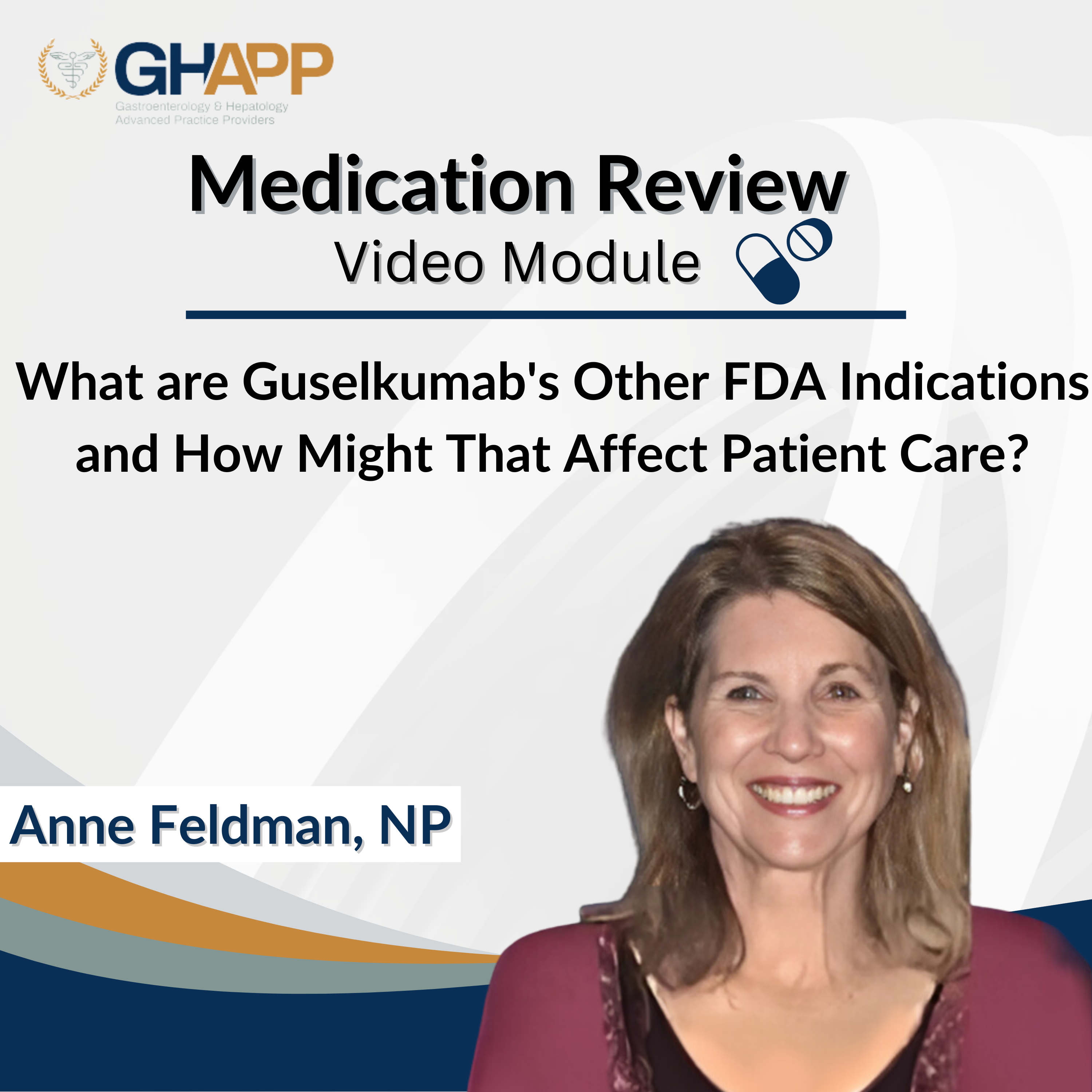 GHAPPcastMedication Review: What are guselkumab's other FDA indications and how might that affect patient care?Thank you Johnson & Johnson for your support of this Medication Review Video Module. In this video, Anne Feldman, NP, from Cleveland Clinic, discusses Guselkumab (Tremfya), an FDA-approved treatment for adults with moderate to severe ulcerative colitis, plaque psoriasis, and psoriatic arthritis. With promising Phase 3 clinical trial results, Guselkumab is expected to receive FDA approval for Crohn’s disease, making it a potential first-line advanced therapy or an option for patients who have failed other advanced treatments.Beyond gut-related inflammation, extraintestinal manifestations (EIMs)—affecting the skin, joints, and eyes—are common in IBD (Inflammatory Bowel Disease), especi...2025-02-2002 min
GHAPPcastMedication Review: What are guselkumab's other FDA indications and how might that affect patient care?Thank you Johnson & Johnson for your support of this Medication Review Video Module. In this video, Anne Feldman, NP, from Cleveland Clinic, discusses Guselkumab (Tremfya), an FDA-approved treatment for adults with moderate to severe ulcerative colitis, plaque psoriasis, and psoriatic arthritis. With promising Phase 3 clinical trial results, Guselkumab is expected to receive FDA approval for Crohn’s disease, making it a potential first-line advanced therapy or an option for patients who have failed other advanced treatments.Beyond gut-related inflammation, extraintestinal manifestations (EIMs)—affecting the skin, joints, and eyes—are common in IBD (Inflammatory Bowel Disease), especi...2025-02-2002 min GHAPPcastKOL Interview: Can You Discuss Any Recent Breakthroughs in the Management of Cirrhosis?In this video, Sherona Bau, NP, at Pfleger Institute at UCLA, shares the latest advancements in cirrhosis management, including newly FDA-approved medications and updated AASLD (American Association for the Study of Liver Diseases) guidelines. While there are still limited medications specifically for cirrhosis, recent developments provide promising options for patients with liver disease.One key update is in the management of portal hypertension, where AASLD now recommends non-selective beta blockers like carvedilol for variceal bleeding prophylaxis, particularly due to its vasodilatory effects. Patients with medium or large varices are advised to take these medications to reduce bleeding...2025-02-1902 min
GHAPPcastKOL Interview: Can You Discuss Any Recent Breakthroughs in the Management of Cirrhosis?In this video, Sherona Bau, NP, at Pfleger Institute at UCLA, shares the latest advancements in cirrhosis management, including newly FDA-approved medications and updated AASLD (American Association for the Study of Liver Diseases) guidelines. While there are still limited medications specifically for cirrhosis, recent developments provide promising options for patients with liver disease.One key update is in the management of portal hypertension, where AASLD now recommends non-selective beta blockers like carvedilol for variceal bleeding prophylaxis, particularly due to its vasodilatory effects. Patients with medium or large varices are advised to take these medications to reduce bleeding...2025-02-1902 min GHAPPcastJournal Club: Guselkumab as Maintenance Therapy for Ulcerative Colitis- Phase 3 QUASAR Study ResultsIn this video, Shayla Schoenoff, PA-C, reviews the Phase 3 QUASAR maintenance study, evaluating the efficacy and safety of Guselkumab as a maintenance therapy for moderately to severely active ulcerative colitis. This randomized, double-blind, placebo-controlled study assessed patients who previously had an inadequate response to conventional or advanced therapies and demonstrated a clinical response to GUS IV induction therapy.Key findings show that GUS subcutaneous maintenance therapy significantly improved clinical remission rates, symptomatic remission, endoscopic improvement, and steroid-free remission at Week 44 compared to placebo. Patients receiving 100 mg GUS every 8 weeks and 200 mg GUS every 4 weeks showed higher remission...2025-02-1805 min
GHAPPcastJournal Club: Guselkumab as Maintenance Therapy for Ulcerative Colitis- Phase 3 QUASAR Study ResultsIn this video, Shayla Schoenoff, PA-C, reviews the Phase 3 QUASAR maintenance study, evaluating the efficacy and safety of Guselkumab as a maintenance therapy for moderately to severely active ulcerative colitis. This randomized, double-blind, placebo-controlled study assessed patients who previously had an inadequate response to conventional or advanced therapies and demonstrated a clinical response to GUS IV induction therapy.Key findings show that GUS subcutaneous maintenance therapy significantly improved clinical remission rates, symptomatic remission, endoscopic improvement, and steroid-free remission at Week 44 compared to placebo. Patients receiving 100 mg GUS every 8 weeks and 200 mg GUS every 4 weeks showed higher remission...2025-02-1805 min GHAPPcastFAQ: What should patients know about living with cirrhosis?In this video, Janet Gripshover, CRNP, Nurse Manager at Cedars-Sinai Liver Transplant Program, discusses essential steps for managing cirrhosis to improve quality of life and longevity. The most critical action for anyone living with liver disease is to completely eliminate alcohol consumption, as alcohol accelerates liver damage, increases fibrosis, and raises the risk of decompensated cirrhosis, which can severely impact daily functioning and overall health.A low-sodium, high-protein diet is also vital for cirrhosis management. Reducing sodium intake helps prevent fluid retention, which can cause discomfort, swelling, and difficulty breathing. Adequate protein intake—about 1.2 grams per kilogram of...2025-02-1703 min
GHAPPcastFAQ: What should patients know about living with cirrhosis?In this video, Janet Gripshover, CRNP, Nurse Manager at Cedars-Sinai Liver Transplant Program, discusses essential steps for managing cirrhosis to improve quality of life and longevity. The most critical action for anyone living with liver disease is to completely eliminate alcohol consumption, as alcohol accelerates liver damage, increases fibrosis, and raises the risk of decompensated cirrhosis, which can severely impact daily functioning and overall health.A low-sodium, high-protein diet is also vital for cirrhosis management. Reducing sodium intake helps prevent fluid retention, which can cause discomfort, swelling, and difficulty breathing. Adequate protein intake—about 1.2 grams per kilogram of...2025-02-1703 min GHAPPcastFAQ: What are predictive risk factors for disease severity in CD and UC?Thank you Johnson & Johnson for your support of this FAQ Video Module. In this FAQ video module, Erin Darguzas, NP, Gastroenterology Specialist at Northwestern Medicine, discusses the predictive risk factors for disease severity in Crohn’s disease and ulcerative colitis. Over the past 15 years, researchers have identified multiple prognostic factors that can help predict disease progression and guide individualized IBD management.For moderate to severe Crohn’s disease, key factors include age at diagnosis (before 40), disease location (small bowel, colonic, or upper GI involvement), and disease behavior (structuring, penetrating, or perianal disease). Additional concerns include deep...2025-02-1302 min
GHAPPcastFAQ: What are predictive risk factors for disease severity in CD and UC?Thank you Johnson & Johnson for your support of this FAQ Video Module. In this FAQ video module, Erin Darguzas, NP, Gastroenterology Specialist at Northwestern Medicine, discusses the predictive risk factors for disease severity in Crohn’s disease and ulcerative colitis. Over the past 15 years, researchers have identified multiple prognostic factors that can help predict disease progression and guide individualized IBD management.For moderate to severe Crohn’s disease, key factors include age at diagnosis (before 40), disease location (small bowel, colonic, or upper GI involvement), and disease behavior (structuring, penetrating, or perianal disease). Additional concerns include deep...2025-02-1302 min GHAPPcastWhat lifestyle changes are essential for managing cirrhosis effectively?In this video, Sherona Bau, NP, from the Pfleger Liver Institute at UCLA, discusses the essential lifestyle changes for effectively managing cirrhosis. Maintaining a healthy lifestyle is key to slowing disease progression and preventing complications. One of the most critical recommendations is completely avoiding alcohol, as it accelerates liver damage and increases the risk of decompensation.A low-sodium diet is also essential, with a daily limit of no more than 2,000 mg of sodium to help reduce fluid retention, leg swelling, and abdominal ascites. Patients should avoid processed and canned foods, which are often high in sodium, and...2025-02-1202 min
GHAPPcastWhat lifestyle changes are essential for managing cirrhosis effectively?In this video, Sherona Bau, NP, from the Pfleger Liver Institute at UCLA, discusses the essential lifestyle changes for effectively managing cirrhosis. Maintaining a healthy lifestyle is key to slowing disease progression and preventing complications. One of the most critical recommendations is completely avoiding alcohol, as it accelerates liver damage and increases the risk of decompensation.A low-sodium diet is also essential, with a daily limit of no more than 2,000 mg of sodium to help reduce fluid retention, leg swelling, and abdominal ascites. Patients should avoid processed and canned foods, which are often high in sodium, and...2025-02-1202 min GHAPPcastJournal Club: Guselkumab Efficacy & Safety in Moderate to Severe CD-GALAXI 2 & 3 ResultsThank you Johnson & Johnson for your support of this Journal Club Video Module. In this video, Jamie Brogan, NP, from Northwestern Medicine in Chicago, discusses the efficacy and safety of Guselkumab therapy for patients with moderate to severely active Crohn’s disease, highlighting results from the Galaxy 2 and Galaxy 3 trials. Guselkumab is a dual-acting IL-23p19 subunit inhibitor, designed to neutralize IL-23 and bind to the CD64 receptor, which plays a role in the production of IL-23.The Galaxy 2 and 3 Phase 3 trials used a randomized, double-blind, double-dummy treat-through design to evaluate IV induction and subcutaneous ma...2025-02-1104 min
GHAPPcastJournal Club: Guselkumab Efficacy & Safety in Moderate to Severe CD-GALAXI 2 & 3 ResultsThank you Johnson & Johnson for your support of this Journal Club Video Module. In this video, Jamie Brogan, NP, from Northwestern Medicine in Chicago, discusses the efficacy and safety of Guselkumab therapy for patients with moderate to severely active Crohn’s disease, highlighting results from the Galaxy 2 and Galaxy 3 trials. Guselkumab is a dual-acting IL-23p19 subunit inhibitor, designed to neutralize IL-23 and bind to the CD64 receptor, which plays a role in the production of IL-23.The Galaxy 2 and 3 Phase 3 trials used a randomized, double-blind, double-dummy treat-through design to evaluate IV induction and subcutaneous ma...2025-02-1104 min GHAPPcastFAQ: How Can You Support a Shared Decision-Making Process With the Patient?In this video, Allison Moser, a transplant hepatology nurse practitioner at Rush University Medical Center, discusses the key principles of shared decision-making and how healthcare providers can better support their patients in making informed choices about their care. Shared decision-making is a collaborative approach that prioritizes communication, respect, and patient autonomy, ensuring that treatment decisions align with the patient’s values and preferences.Effective shared decision-making begins with active listening—understanding the patient’s concerns, goals, and priorities. It also involves clear communication, providing easy-to-understand explanations of treatment options, risks, and benefits. Visual aids and simple language can he...2025-02-1002 min
GHAPPcastFAQ: How Can You Support a Shared Decision-Making Process With the Patient?In this video, Allison Moser, a transplant hepatology nurse practitioner at Rush University Medical Center, discusses the key principles of shared decision-making and how healthcare providers can better support their patients in making informed choices about their care. Shared decision-making is a collaborative approach that prioritizes communication, respect, and patient autonomy, ensuring that treatment decisions align with the patient’s values and preferences.Effective shared decision-making begins with active listening—understanding the patient’s concerns, goals, and priorities. It also involves clear communication, providing easy-to-understand explanations of treatment options, risks, and benefits. Visual aids and simple language can he...2025-02-1002 min GHAPPcastMedication Review: What is the efficacy of guselkumab in ulcerative colitis and Crohn's disease?Thank you Johnson & Johnson for your support of this Medication Review Video Module. In this comprehensive medication review, Peter Byrne, FNP, from South Denver Gastroenterology, discusses the efficacy of guselkumab in treating ulcerative colitis (UC) and Crohn’s disease (CD) based on key clinical trials, including Quasar and Galaxy 1.Guselkumab has demonstrated significant efficacy in treating both ulcerative colitis (UC) and Crohn’s disease (CD), as highlighted in key clinical trials, including Quasar and Galaxy 1. In the Quasar trial, a Phase 3, randomized, placebo-controlled study, 701 patients with moderate to severe ulcerative colitis who had an inadequate resp...2025-02-0608 min
GHAPPcastMedication Review: What is the efficacy of guselkumab in ulcerative colitis and Crohn's disease?Thank you Johnson & Johnson for your support of this Medication Review Video Module. In this comprehensive medication review, Peter Byrne, FNP, from South Denver Gastroenterology, discusses the efficacy of guselkumab in treating ulcerative colitis (UC) and Crohn’s disease (CD) based on key clinical trials, including Quasar and Galaxy 1.Guselkumab has demonstrated significant efficacy in treating both ulcerative colitis (UC) and Crohn’s disease (CD), as highlighted in key clinical trials, including Quasar and Galaxy 1. In the Quasar trial, a Phase 3, randomized, placebo-controlled study, 701 patients with moderate to severe ulcerative colitis who had an inadequate resp...2025-02-0608 min GHAPPcastFAQ: How can physicians better care for patients with cirrhosis?Sherona Bau, NP, at Pfleger Liver Institute, discusses the importance of providing effective care for patients with cirrhosis, which requires a proactive and comprehensive approach from healthcare providers, including physicians and advanced practice providers. Early diagnosis is crucial, as many patients with compensated cirrhosis remain asymptomatic. Using non-invasive testing, such as FibroScan or morphology imaging, can help identify liver damage and make a timely diagnosis. Once cirrhosis is diagnosed, patient education becomes essential. Providers should emphasize the importance of abstinence from alcohol, as patients may unknowingly continue drinking if unaware of their condition. It is also vital...2025-02-0502 min
GHAPPcastFAQ: How can physicians better care for patients with cirrhosis?Sherona Bau, NP, at Pfleger Liver Institute, discusses the importance of providing effective care for patients with cirrhosis, which requires a proactive and comprehensive approach from healthcare providers, including physicians and advanced practice providers. Early diagnosis is crucial, as many patients with compensated cirrhosis remain asymptomatic. Using non-invasive testing, such as FibroScan or morphology imaging, can help identify liver damage and make a timely diagnosis. Once cirrhosis is diagnosed, patient education becomes essential. Providers should emphasize the importance of abstinence from alcohol, as patients may unknowingly continue drinking if unaware of their condition. It is also vital...2025-02-0502 min GHAPPcastMedication Review: What is the safety profile of guselkumab in ulcerative colitis and Crohn's disease?Thank you Johnson & Johnson for your support of this Medication Review Video Module. In this medication review module, Peter Byrne, FNP at South Denver Gastroenterology, discusses the safety of guselkumab in the treatment of Ulcerative Colitis and Crohn's disease. The Quasar trial, a phase 3 double-blind study, evaluated the safety of guselkumab in patients with inadequate responses to conventional therapies. Results showed that the incidence of serious adverse events was lower in the guselkumab group (2.9%) compared to placebo (7.1%), with a minimal occurrence of serious infections (less than 1%) in both groups. The safety profile of guselkumab was consistent with...2025-02-0405 min
GHAPPcastMedication Review: What is the safety profile of guselkumab in ulcerative colitis and Crohn's disease?Thank you Johnson & Johnson for your support of this Medication Review Video Module. In this medication review module, Peter Byrne, FNP at South Denver Gastroenterology, discusses the safety of guselkumab in the treatment of Ulcerative Colitis and Crohn's disease. The Quasar trial, a phase 3 double-blind study, evaluated the safety of guselkumab in patients with inadequate responses to conventional therapies. Results showed that the incidence of serious adverse events was lower in the guselkumab group (2.9%) compared to placebo (7.1%), with a minimal occurrence of serious infections (less than 1%) in both groups. The safety profile of guselkumab was consistent with...2025-02-0405 min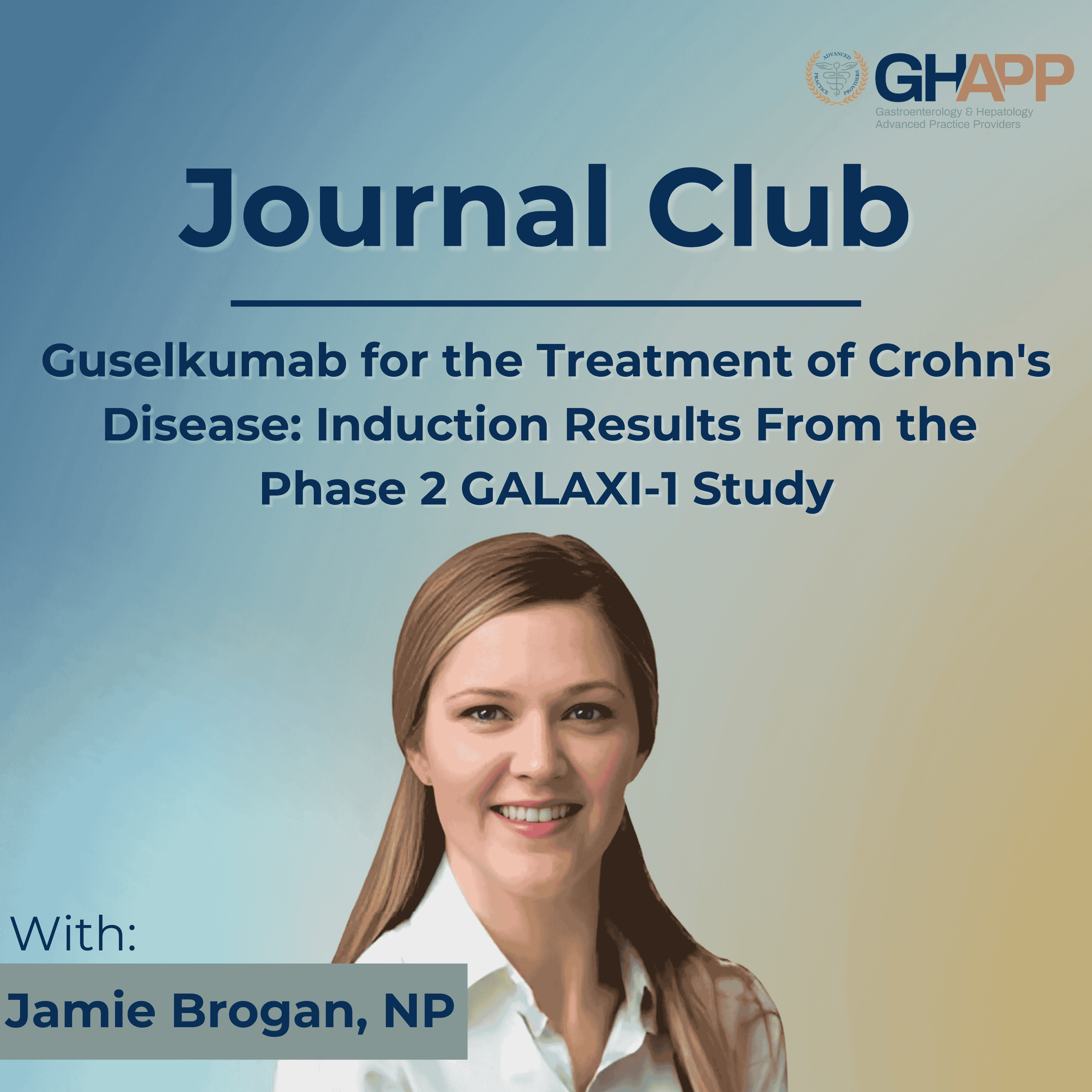 GHAPPcastGuselkumab for the Treatment of Crohn's Disease: Induction Results From the Phase 2 GALAXI-1 StudyThank you Johnson & Johnson for your support of this Journal Club Video Module. In this Journal Club video module, Jamie Brogan, NP, from Northwestern, discusses findings from the Phase 2 GALAXI-1 Study, which evaluated guselkumab, a selective IL-23p19 antagonist, for the treatment of moderate-to-severe Crohn’s disease. This randomized, placebo-controlled study assessed intravenous guselkumab at doses of 200 mg, 600 mg, and 1200 mg, alongside ustekinumab and placebo. At week 12, the results demonstrated significant reductions in Crohn’s Disease Activity Index (CDAI) scores among patients receiving guselkumab compared to those in the placebo group. Clinical remission was achieved in u...2025-01-3003 min
GHAPPcastGuselkumab for the Treatment of Crohn's Disease: Induction Results From the Phase 2 GALAXI-1 StudyThank you Johnson & Johnson for your support of this Journal Club Video Module. In this Journal Club video module, Jamie Brogan, NP, from Northwestern, discusses findings from the Phase 2 GALAXI-1 Study, which evaluated guselkumab, a selective IL-23p19 antagonist, for the treatment of moderate-to-severe Crohn’s disease. This randomized, placebo-controlled study assessed intravenous guselkumab at doses of 200 mg, 600 mg, and 1200 mg, alongside ustekinumab and placebo. At week 12, the results demonstrated significant reductions in Crohn’s Disease Activity Index (CDAI) scores among patients receiving guselkumab compared to those in the placebo group. Clinical remission was achieved in u...2025-01-3003 min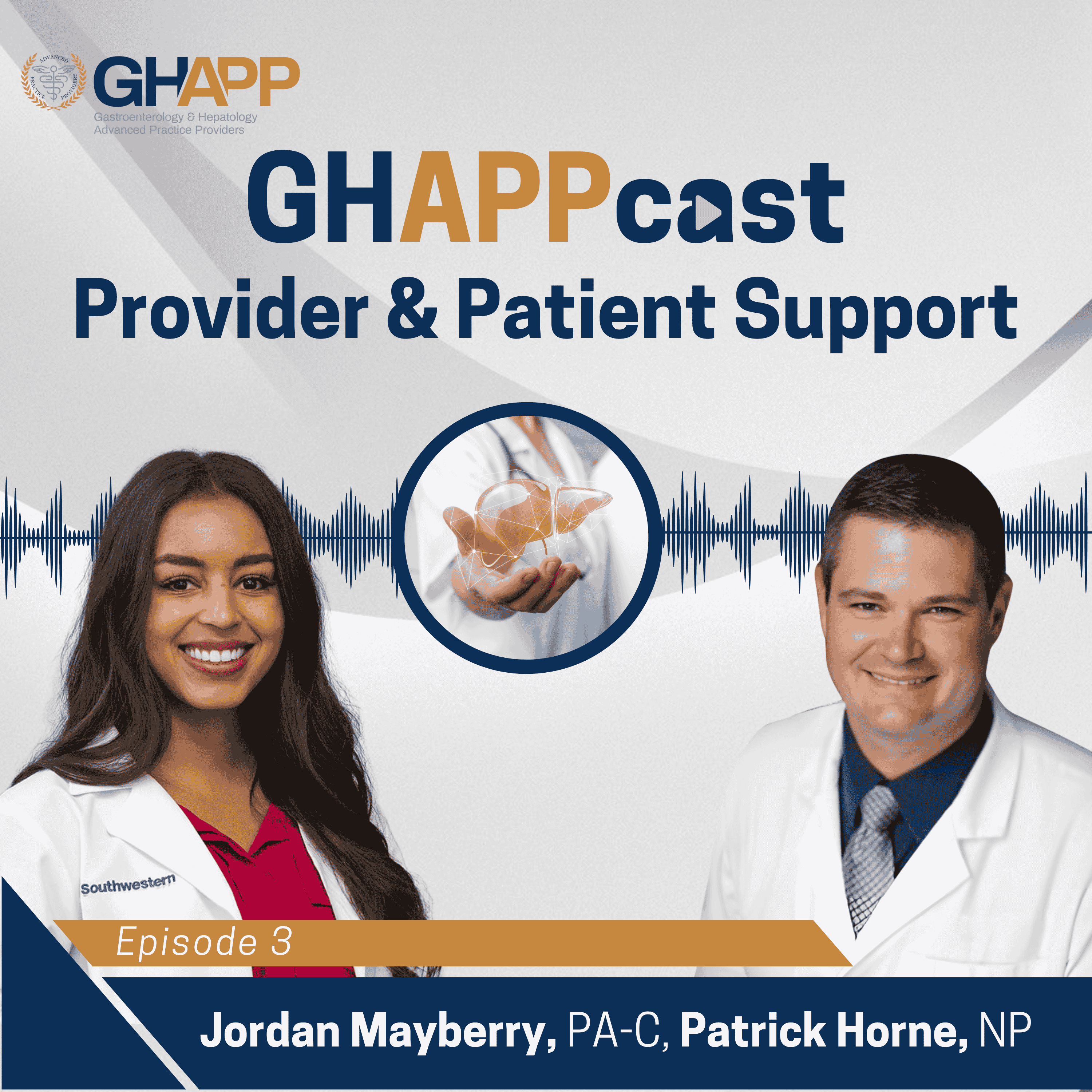 GHAPPcastGHAPPcast Part 3: Provider & Patient SupportIn this episode of GHAPPcast, Jordan Mayberry, a PA-C at UT Southwestern in Dallas, Texas, and Patrick Horne, a nurse practitioner from the University of Florida, dive deep into the support strategies for healthcare providers and patients managing chronic liver disease and cirrhosis.As a healthcare provider, it’s essential to rely on a variety of resources to stay up-to-date on the latest guidelines and treatment options for chronic liver disease and cirrhosis. He mentions several online resources like GHAPP, AASLD, and EASL as key platforms he uses in his practice. He also mentions up-to-date clinical practice gu...2025-01-2910 min
GHAPPcastGHAPPcast Part 3: Provider & Patient SupportIn this episode of GHAPPcast, Jordan Mayberry, a PA-C at UT Southwestern in Dallas, Texas, and Patrick Horne, a nurse practitioner from the University of Florida, dive deep into the support strategies for healthcare providers and patients managing chronic liver disease and cirrhosis.As a healthcare provider, it’s essential to rely on a variety of resources to stay up-to-date on the latest guidelines and treatment options for chronic liver disease and cirrhosis. He mentions several online resources like GHAPP, AASLD, and EASL as key platforms he uses in his practice. He also mentions up-to-date clinical practice gu...2025-01-2910 min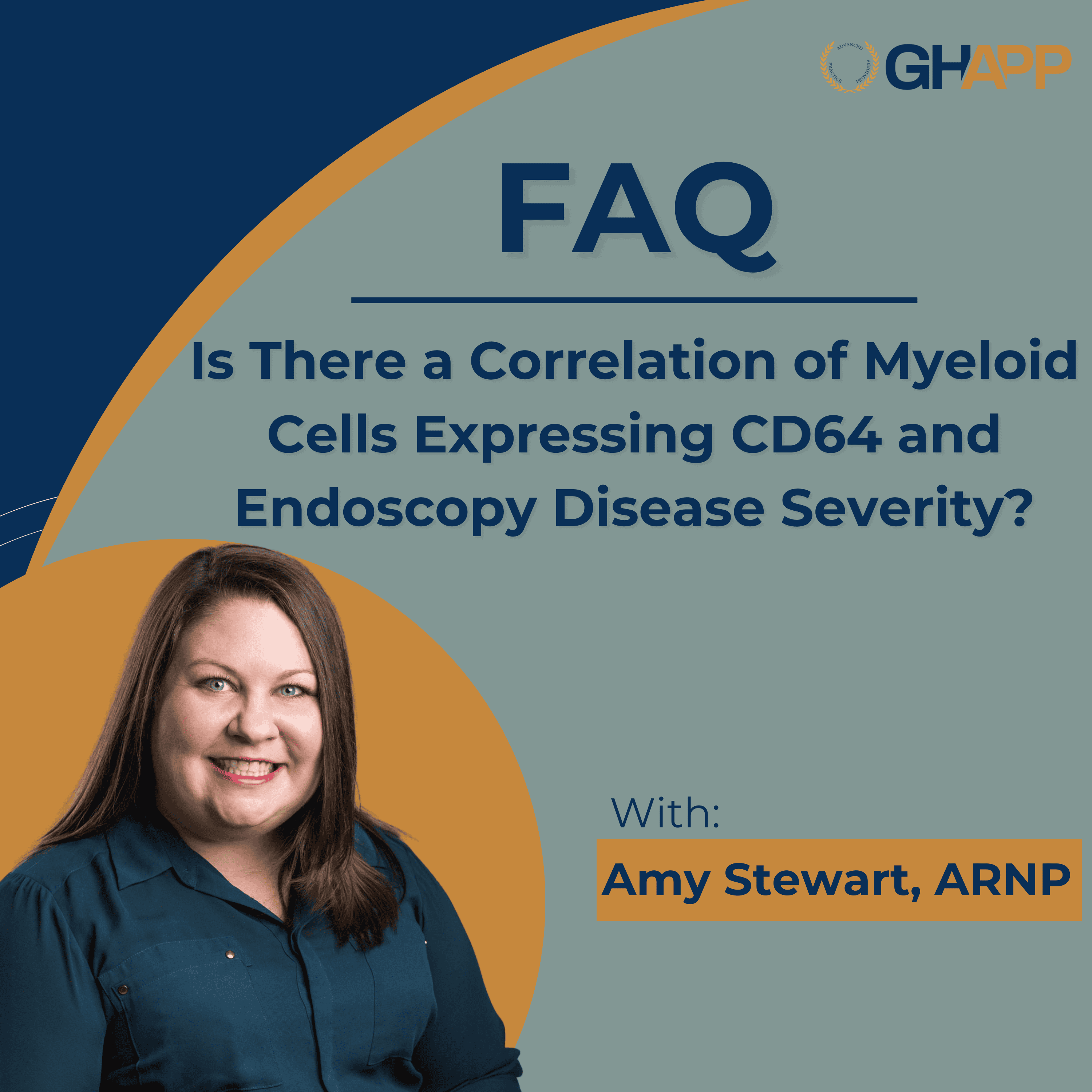 GHAPPcastIs there a correlation of myeloid cells expressing CD64 and endoscopy disease severity?Thank you Johnson & Johnson for your support of this FAQ Video Module. In this video module, Amy Stewart, NP, from Capital Digestive Care, in Washington, D.C., explores the potential correlation between CD64-expressing myeloid cells and endoscopic disease severity in patients with inflammatory bowel disease (IBD).CD64 is a plasma membrane receptor found on myeloid cells, a category of blood cells originating from the bone marrow. Myeloid cells include monocytes, macrophages, granulocytes, and dendritic cells, all of which play an essential role in the innate immune response.In IBD, these immune cells...2025-01-2801 min
GHAPPcastIs there a correlation of myeloid cells expressing CD64 and endoscopy disease severity?Thank you Johnson & Johnson for your support of this FAQ Video Module. In this video module, Amy Stewart, NP, from Capital Digestive Care, in Washington, D.C., explores the potential correlation between CD64-expressing myeloid cells and endoscopic disease severity in patients with inflammatory bowel disease (IBD).CD64 is a plasma membrane receptor found on myeloid cells, a category of blood cells originating from the bone marrow. Myeloid cells include monocytes, macrophages, granulocytes, and dendritic cells, all of which play an essential role in the innate immune response.In IBD, these immune cells...2025-01-2801 min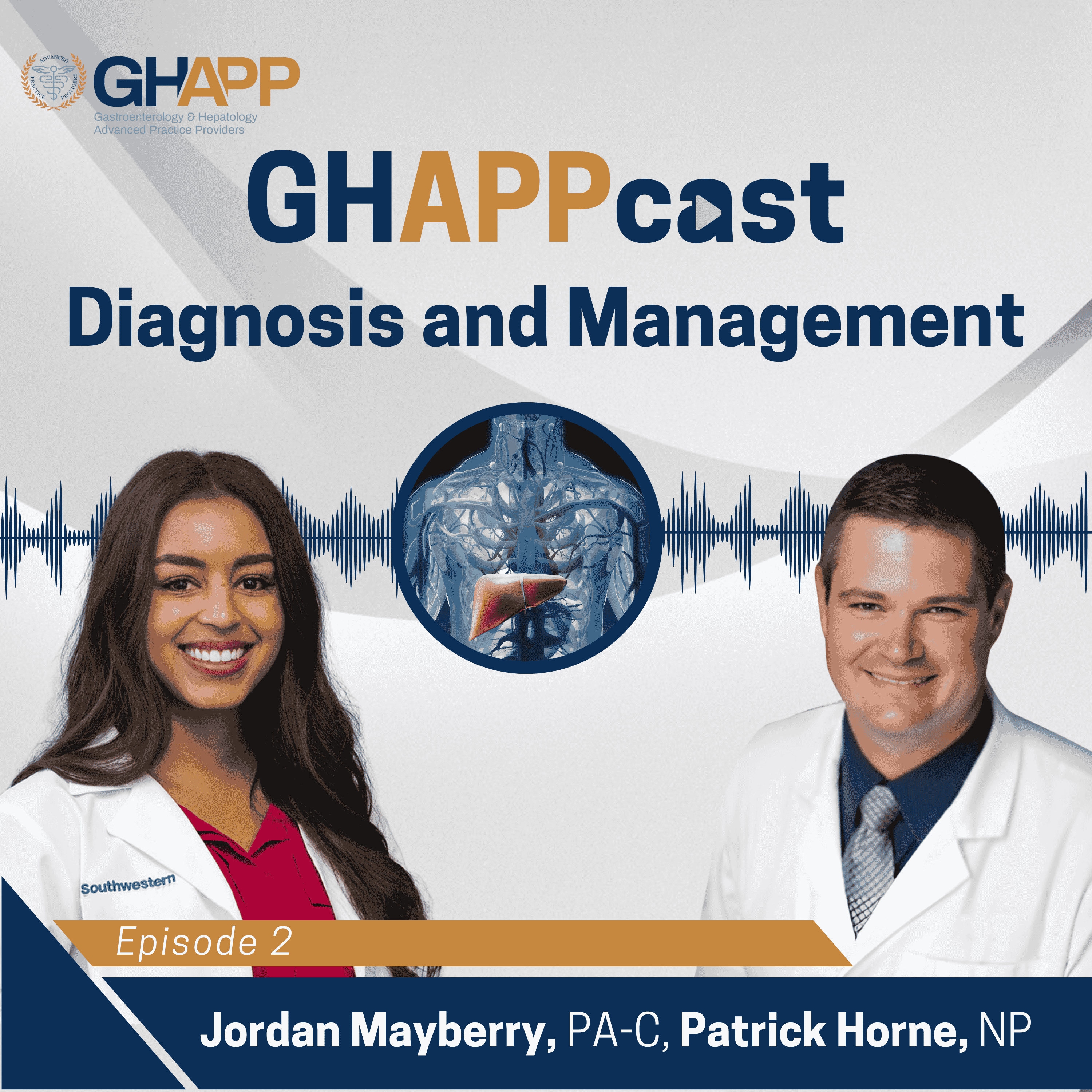 GHAPPcastGHAPPcast Part 2: Diagnosis and ManagementIn this insightful GHAPPcast podcast, Patrick Horne, a nurse practitioner at the University of Florida, joins Jordan Mayberry, a physician assistant at UT Southwestern, to discuss the diagnosis and management of cirrhosis. They explore the latest diagnostic techniques, the role of non-invasive testing, and strategies for monitoring and managing cirrhosis patients to ensure the best possible care.When diagnosing cirrhosis, Jordan Mayberry emphasizes a multi-faceted approach that includes lab work, physical exams, and imaging. Essential diagnostic markers include liver enzyme tests to assess inflammation, albumin, bilirubin, and INR tests to evaluate liver function, and platelet counts, as...2025-01-2412 min
GHAPPcastGHAPPcast Part 2: Diagnosis and ManagementIn this insightful GHAPPcast podcast, Patrick Horne, a nurse practitioner at the University of Florida, joins Jordan Mayberry, a physician assistant at UT Southwestern, to discuss the diagnosis and management of cirrhosis. They explore the latest diagnostic techniques, the role of non-invasive testing, and strategies for monitoring and managing cirrhosis patients to ensure the best possible care.When diagnosing cirrhosis, Jordan Mayberry emphasizes a multi-faceted approach that includes lab work, physical exams, and imaging. Essential diagnostic markers include liver enzyme tests to assess inflammation, albumin, bilirubin, and INR tests to evaluate liver function, and platelet counts, as...2025-01-2412 min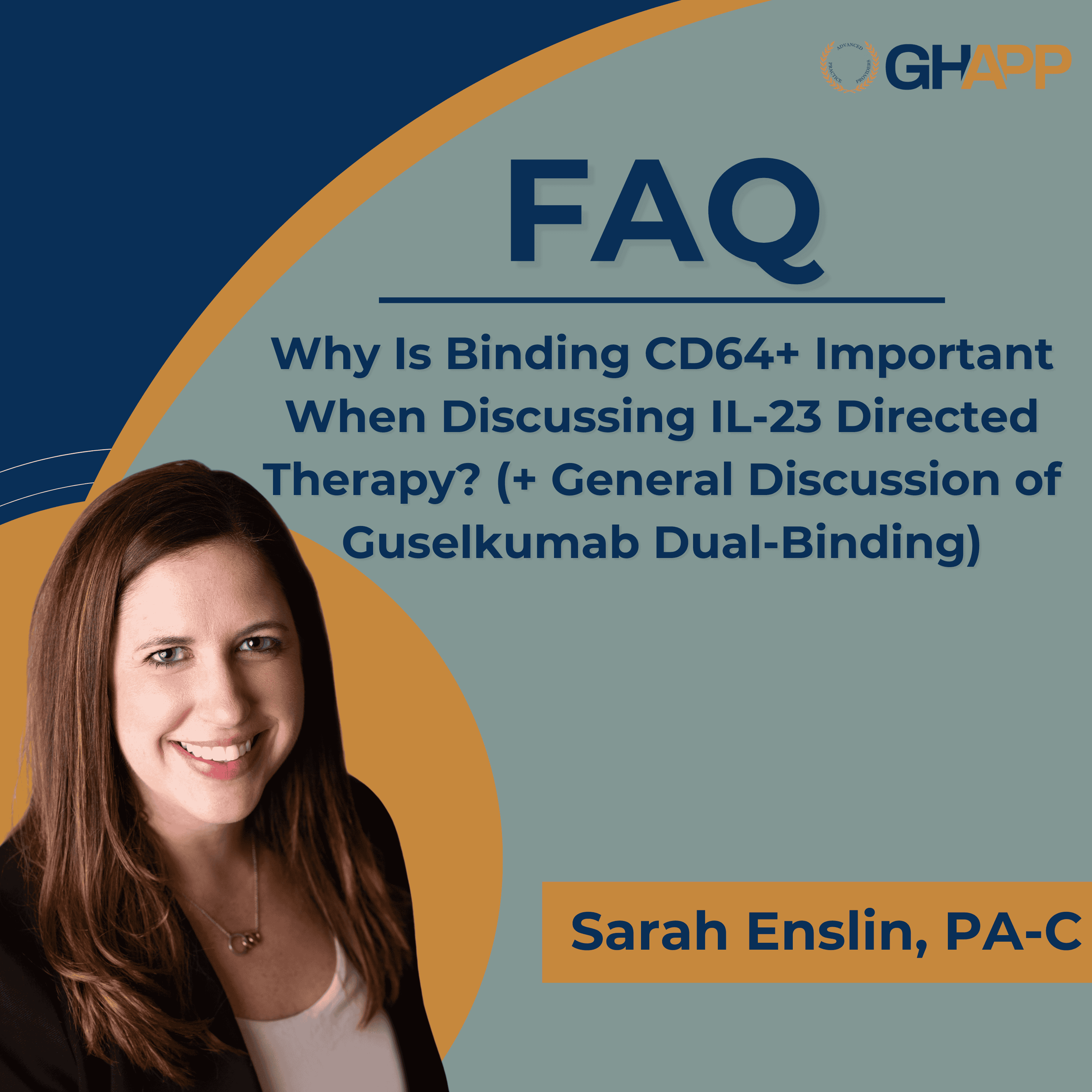 GHAPPcastFAQ: Why is binding CD64+ important when discussing IL23 directed therapy?Thank you Johnson & Johnson for your support of this FAQ Video Module. Join Sarah Enslin, PA-C, from the University of Rochester Medical Center, as she explores the latest advancements in CD64-positive cell targeting and IL-23-directed therapy. This innovative approach enhances the specificity and effectiveness of treatment for psoriasis, psoriatic arthritis, and inflammatory bowel disease (IBD) by engaging immune cells responsible for chronic inflammation.Learn how CD64, a high-affinity receptor on monocytes, macrophages, and dendritic cells, becomes upregulated during inflammation, making it a critical target for IL-23 inhibitors. Discover the role of monoclonal antibodies...2025-01-2302 min
GHAPPcastFAQ: Why is binding CD64+ important when discussing IL23 directed therapy?Thank you Johnson & Johnson for your support of this FAQ Video Module. Join Sarah Enslin, PA-C, from the University of Rochester Medical Center, as she explores the latest advancements in CD64-positive cell targeting and IL-23-directed therapy. This innovative approach enhances the specificity and effectiveness of treatment for psoriasis, psoriatic arthritis, and inflammatory bowel disease (IBD) by engaging immune cells responsible for chronic inflammation.Learn how CD64, a high-affinity receptor on monocytes, macrophages, and dendritic cells, becomes upregulated during inflammation, making it a critical target for IL-23 inhibitors. Discover the role of monoclonal antibodies...2025-01-2302 min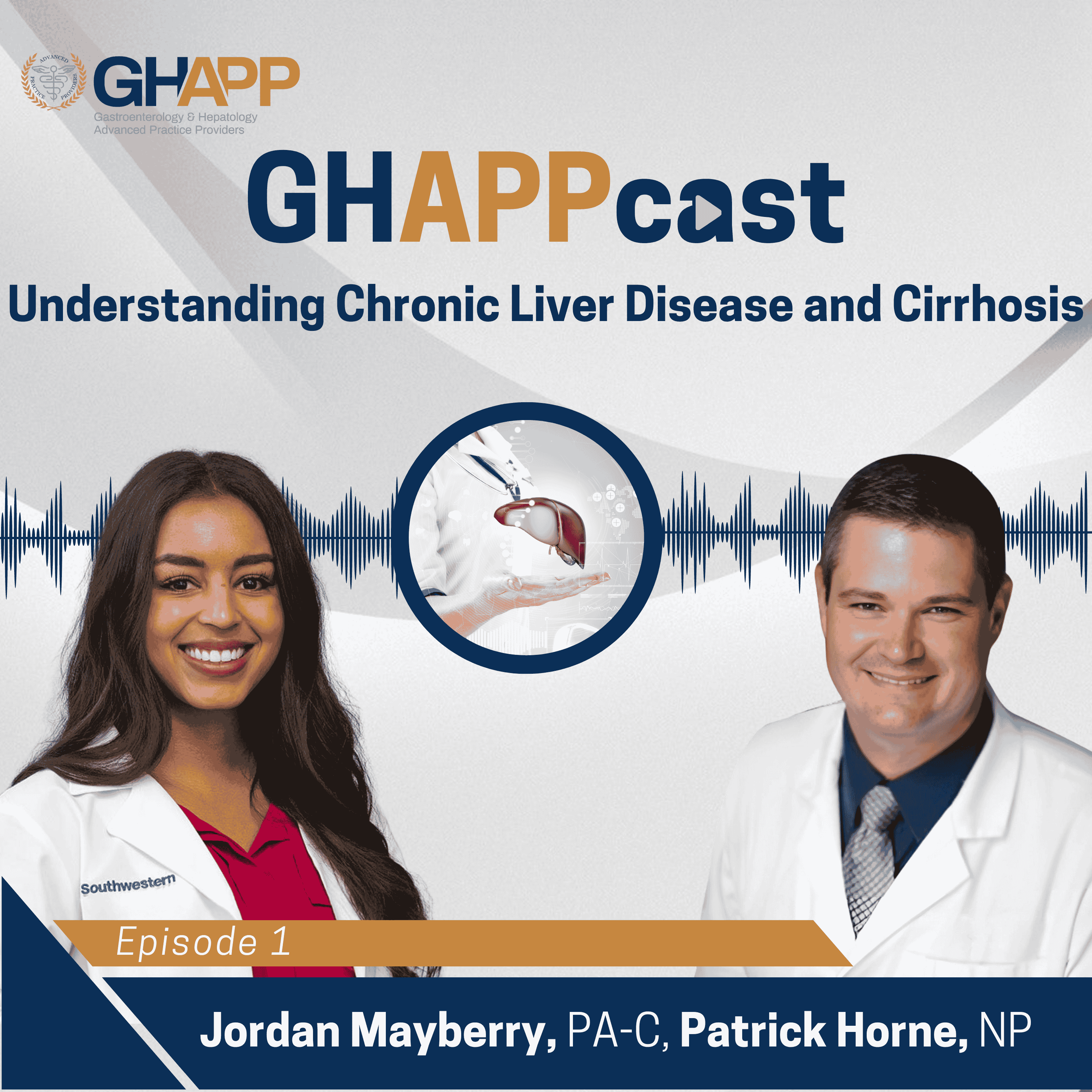 GHAPPcastGHAPPcast Part 1: Understanding Chronic Liver Disease and CirrhosisIn this GHAPP podcast episode, Jordan Mayberry, PA-C, and Patrick Horne, NP, dive deep into the complexities of chronic liver disease and its progression to cirrhosis. Drawing on over 11 years of experience in hepatology, Jordan and Patrick discuss the most common causes of liver disease, including viral hepatitis (Hepatitis B & C), alcohol-related liver disease, and metabolic-associated steatotic liver disease (MASLD) and metabolic-associated steatohepatitis (MASH). They explore the increasing prevalence of these conditions and how the rise in diagnoses is reshaping treatment strategies across the country.Through their discussion, they explain how chronic liver diseases gradually progress, starting...2025-01-2210 min
GHAPPcastGHAPPcast Part 1: Understanding Chronic Liver Disease and CirrhosisIn this GHAPP podcast episode, Jordan Mayberry, PA-C, and Patrick Horne, NP, dive deep into the complexities of chronic liver disease and its progression to cirrhosis. Drawing on over 11 years of experience in hepatology, Jordan and Patrick discuss the most common causes of liver disease, including viral hepatitis (Hepatitis B & C), alcohol-related liver disease, and metabolic-associated steatotic liver disease (MASLD) and metabolic-associated steatohepatitis (MASH). They explore the increasing prevalence of these conditions and how the rise in diagnoses is reshaping treatment strategies across the country.Through their discussion, they explain how chronic liver diseases gradually progress, starting...2025-01-2210 min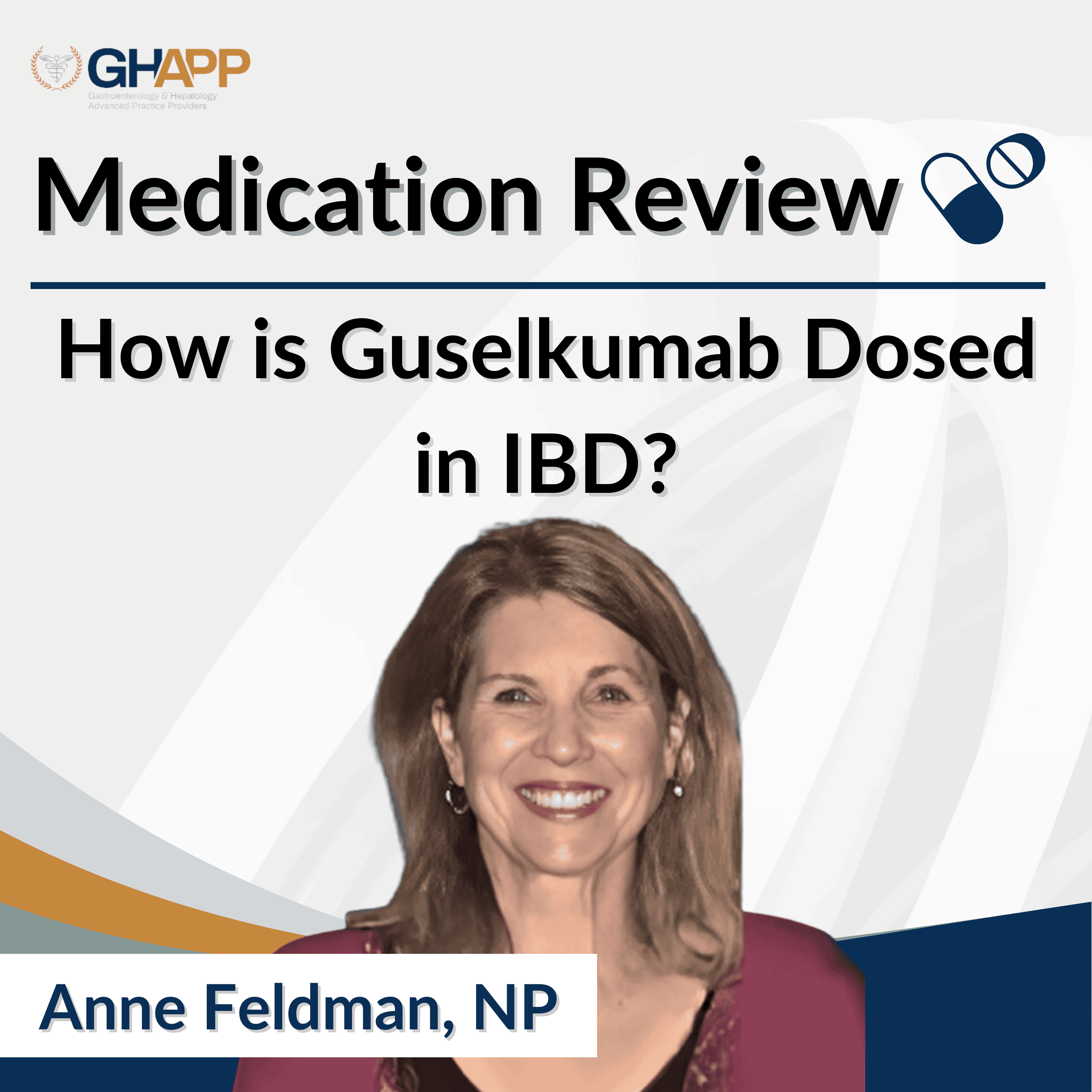 GHAPPcastMedication Review: How is guselkumab dosed in IBD?Thank you Johnson & Johnson for your support of this Medication Review Video Module. In this medication review video module, Anne Feldman, NP, from the Cleveland Clinic Foundation, provides an in-depth overview of Guselkumab, an FDA-approved treatment for moderately to severely active ulcerative colitis. Anne explains the mechanism of action of Guselkumab, which is a dual-action monoclonal antibody that targets key pro-inflammatory proteins and their receptors, disrupting the inflammatory cascade responsible for chronic inflammation in conditions like ulcerative colitis, psoriasis, and psoriatic arthritis.This monoclonal antibody therapy works by inhibiting the IL-23 protein, which plays a...2025-01-2103 min
GHAPPcastMedication Review: How is guselkumab dosed in IBD?Thank you Johnson & Johnson for your support of this Medication Review Video Module. In this medication review video module, Anne Feldman, NP, from the Cleveland Clinic Foundation, provides an in-depth overview of Guselkumab, an FDA-approved treatment for moderately to severely active ulcerative colitis. Anne explains the mechanism of action of Guselkumab, which is a dual-action monoclonal antibody that targets key pro-inflammatory proteins and their receptors, disrupting the inflammatory cascade responsible for chronic inflammation in conditions like ulcerative colitis, psoriasis, and psoriatic arthritis.This monoclonal antibody therapy works by inhibiting the IL-23 protein, which plays a...2025-01-2103 min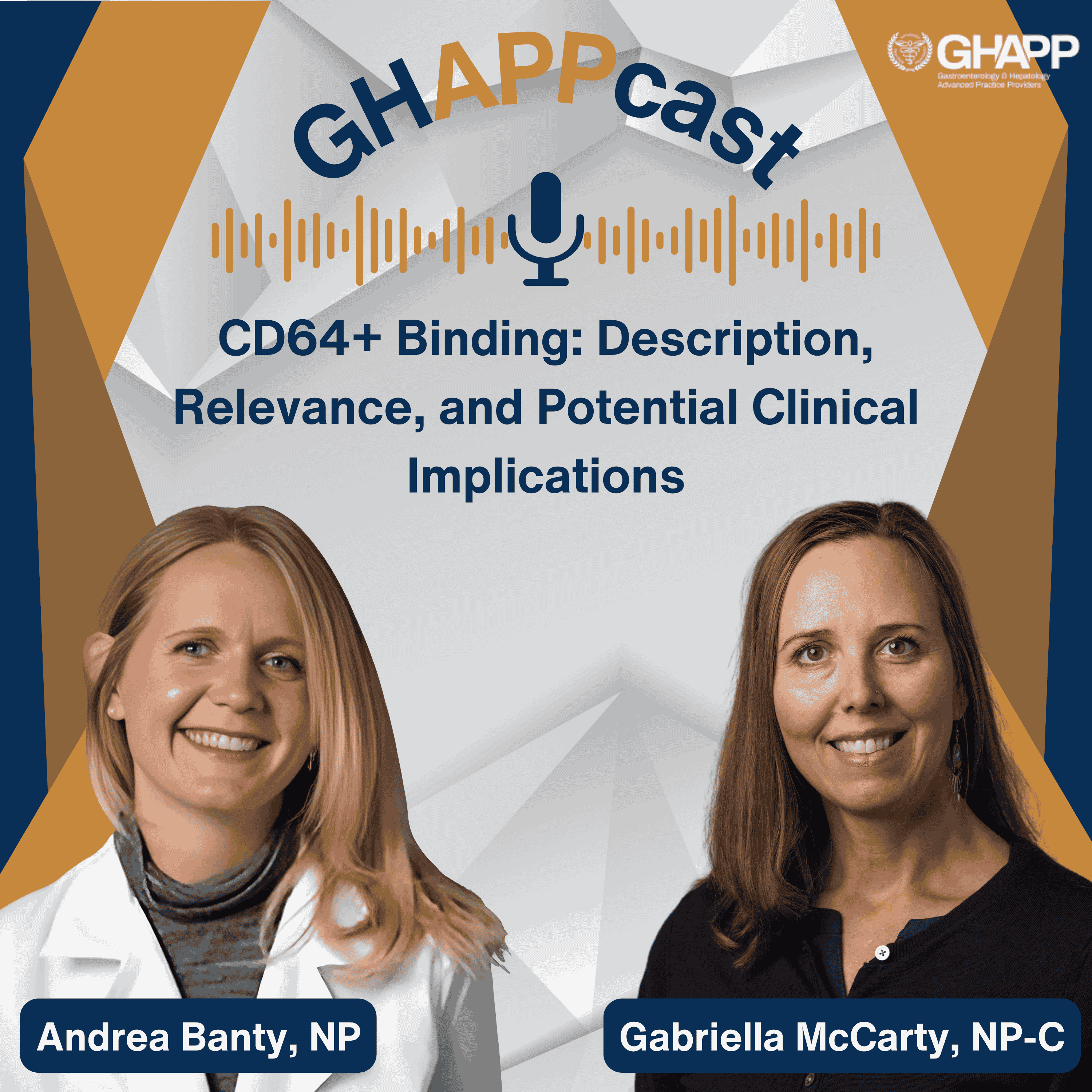 GHAPPcastGHAPPcast: CD64+ Binding: Description, Relevance, and Potential Clinical ImplicationsThank you Johnson & Johnson for your support of this GHAPPcast episode. In this insightful episode of GHAPPcast, the official podcast of the Gastroenterology and Hepatology Advanced Practice Providers, host Gabriella McCarty, NP-C, delves into the complex yet critical topic of CD64 positive binding and its relevance in inflammatory bowel disease (IBD) treatment, particularly in relation to Interleukin-23 (IL-23) inhibition. Gabriella is joined by Andrea Banty, NP, a respected GHAPP faculty member and expert in gastroenterology, who provides valuable insights into the role of CD64 in the immune system and its impact on diseases like Crohn’s disease an...2025-01-1611 min
GHAPPcastGHAPPcast: CD64+ Binding: Description, Relevance, and Potential Clinical ImplicationsThank you Johnson & Johnson for your support of this GHAPPcast episode. In this insightful episode of GHAPPcast, the official podcast of the Gastroenterology and Hepatology Advanced Practice Providers, host Gabriella McCarty, NP-C, delves into the complex yet critical topic of CD64 positive binding and its relevance in inflammatory bowel disease (IBD) treatment, particularly in relation to Interleukin-23 (IL-23) inhibition. Gabriella is joined by Andrea Banty, NP, a respected GHAPP faculty member and expert in gastroenterology, who provides valuable insights into the role of CD64 in the immune system and its impact on diseases like Crohn’s disease an...2025-01-1611 min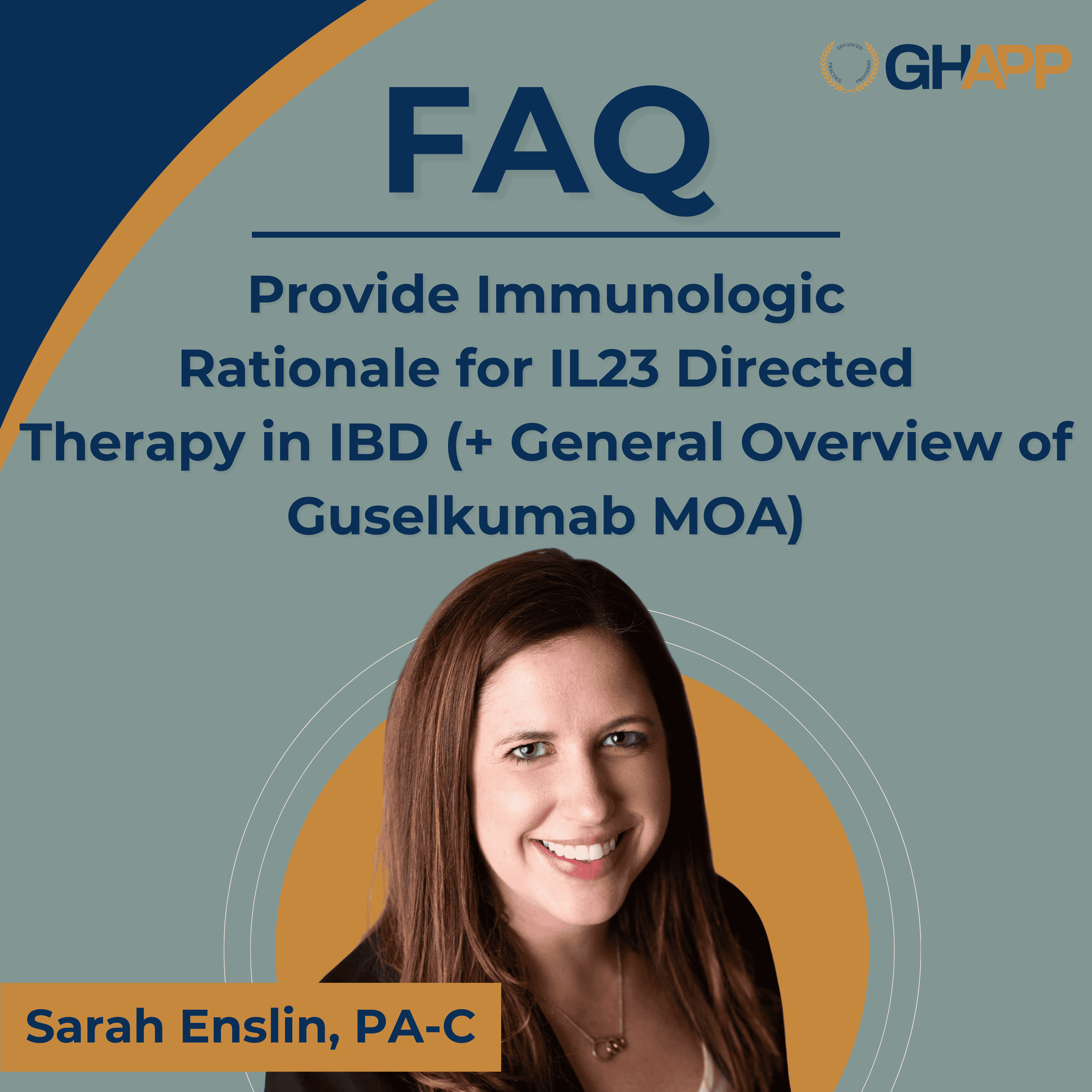 GHAPPcastFAQ: Provide immunologic rationale for IL23 directed therapy in IBD(+ general overview of Guselkumab MOA)Thank you Johnson & Johnson for your support of this FAQ Video Module. In this informative FAQ video module, Sarah Enslin, a physician assistant at the University of Rochester Medical Center, discusses the role of Interleukin-23 (IL-23) in treating immune-mediated inflammatory diseases, particularly inflammatory bowel disease (IBD). Sponsored by Johnson & Johnson, this video highlights how IL-23 directed therapies have revolutionized the management of IBD, including Crohn’s disease and ulcerative colitis.Sarah explains how IL-23, primarily produced by dendritic cells and macrophages, is central to the development of TH17 cells, a subset of CD4+ T cells in...2025-01-1402 min
GHAPPcastFAQ: Provide immunologic rationale for IL23 directed therapy in IBD(+ general overview of Guselkumab MOA)Thank you Johnson & Johnson for your support of this FAQ Video Module. In this informative FAQ video module, Sarah Enslin, a physician assistant at the University of Rochester Medical Center, discusses the role of Interleukin-23 (IL-23) in treating immune-mediated inflammatory diseases, particularly inflammatory bowel disease (IBD). Sponsored by Johnson & Johnson, this video highlights how IL-23 directed therapies have revolutionized the management of IBD, including Crohn’s disease and ulcerative colitis.Sarah explains how IL-23, primarily produced by dendritic cells and macrophages, is central to the development of TH17 cells, a subset of CD4+ T cells in...2025-01-1402 min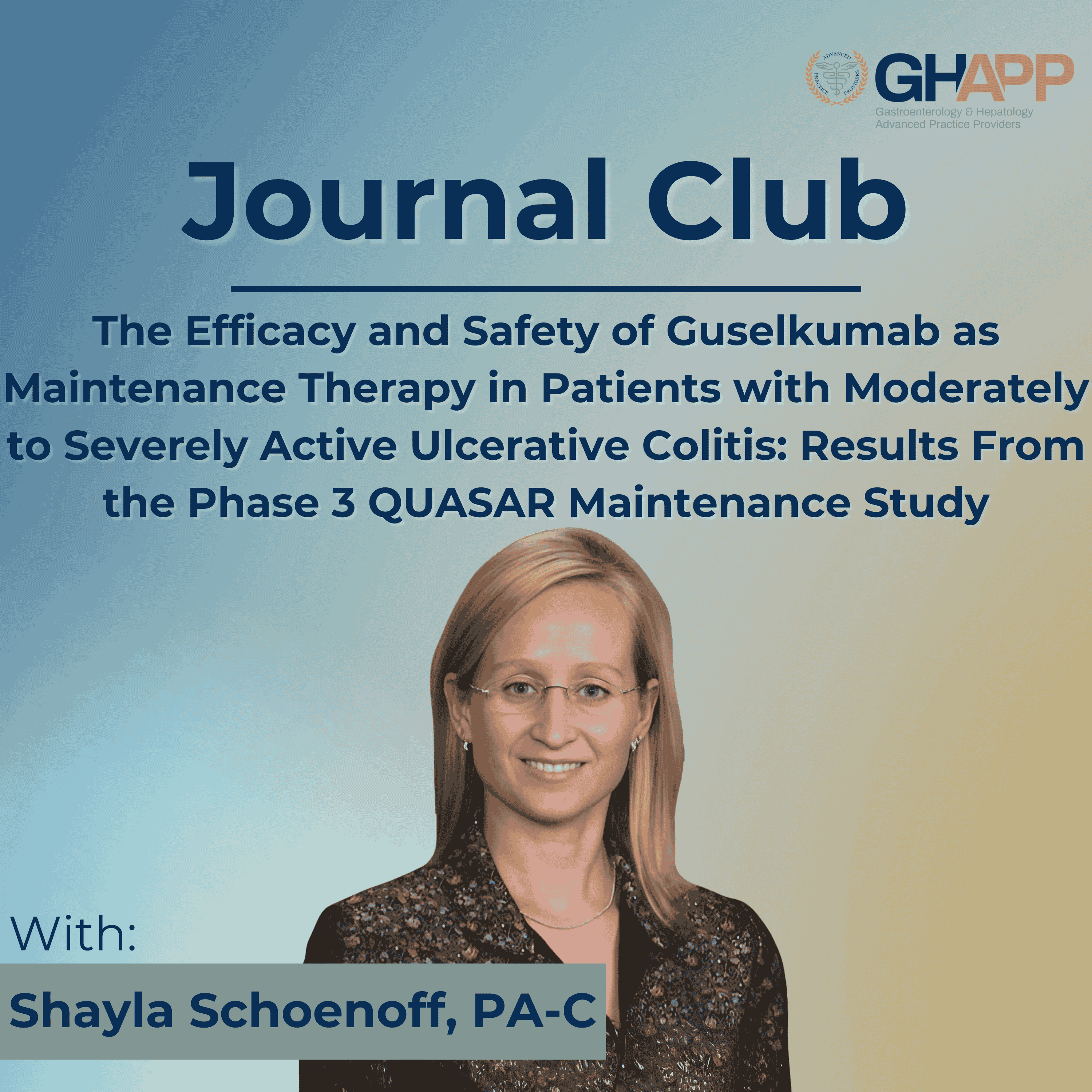 GHAPPcastJournal Club: Guselkumab in Patients With Moderately to Severely Active Ulcerative ColitisThank you Johnson & Johnson for your support of this Journal Club Video Module. In this Journal Club video module, Shayla Scheonoff, a physician assistant from Rochester, Minnesota, provides a comprehensive review of the efficacy and safety of Guselkumab induction therapy for moderately to severely active ulcerative colitis (UC). Sponsored by Johnson & Johnson, this detailed analysis covers both the Phase 2B and Phase 3 QUASAR induction studies for Guselkumab, a dual-acting IL-23 p19 subunit inhibitor that blocks IL-23 and binds to CD64 on cells that produce IL-23. Previously approved for psoriasis and psoriatic arthritis, Guselkumab has shown remarkable promise...2025-01-0905 min
GHAPPcastJournal Club: Guselkumab in Patients With Moderately to Severely Active Ulcerative ColitisThank you Johnson & Johnson for your support of this Journal Club Video Module. In this Journal Club video module, Shayla Scheonoff, a physician assistant from Rochester, Minnesota, provides a comprehensive review of the efficacy and safety of Guselkumab induction therapy for moderately to severely active ulcerative colitis (UC). Sponsored by Johnson & Johnson, this detailed analysis covers both the Phase 2B and Phase 3 QUASAR induction studies for Guselkumab, a dual-acting IL-23 p19 subunit inhibitor that blocks IL-23 and binds to CD64 on cells that produce IL-23. Previously approved for psoriasis and psoriatic arthritis, Guselkumab has shown remarkable promise...2025-01-0905 min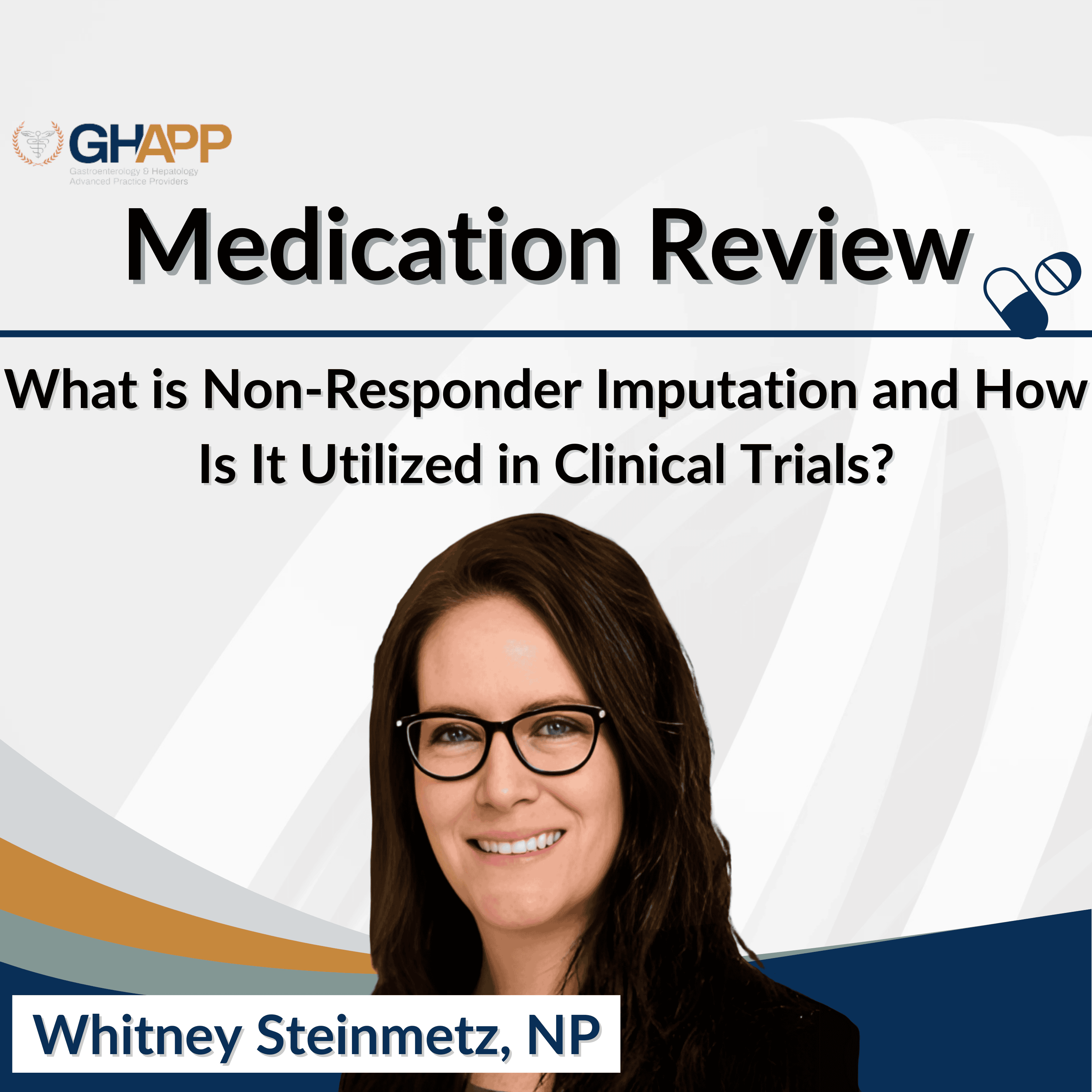 GHAPPcastMedication Review: What is non-responder imputation and how is it utilized in clinical trials?Thank you Johnson & Johnson for your support of this Medication Review Video Module. Clinical trials play a crucial role in guiding treatment decisions, but the way missing data is handled can significantly impact the results. In this medication review video module, Whitney Steinmetz, NP, from Presbyterian Medical Group in Albuquerque, NM, explains the concept of non-responder imputation (NRI)—a widely used statistical method in clinical trials.Non-responder imputation is a conservative approach used to address missing data by assuming that participants who drop out or have missing responses did not respond to treatment. This method he...2025-01-0702 min
GHAPPcastMedication Review: What is non-responder imputation and how is it utilized in clinical trials?Thank you Johnson & Johnson for your support of this Medication Review Video Module. Clinical trials play a crucial role in guiding treatment decisions, but the way missing data is handled can significantly impact the results. In this medication review video module, Whitney Steinmetz, NP, from Presbyterian Medical Group in Albuquerque, NM, explains the concept of non-responder imputation (NRI)—a widely used statistical method in clinical trials.Non-responder imputation is a conservative approach used to address missing data by assuming that participants who drop out or have missing responses did not respond to treatment. This method he...2025-01-0702 min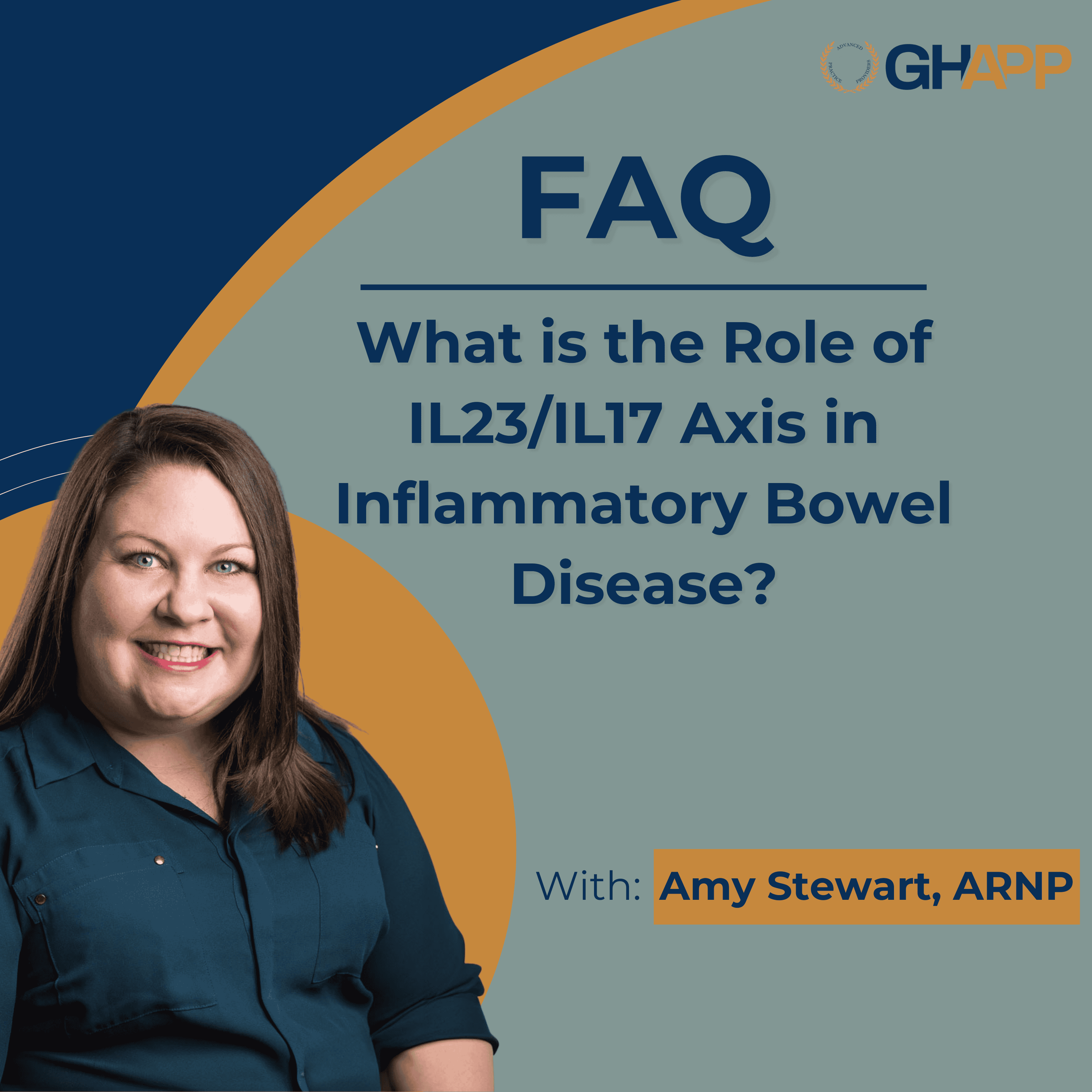 GHAPPcastFAQ: What is the role of IL23/IL17 axis in IBDThank you Johnson & Johnson for your support of this FAQ Video Module. Inflammatory Bowel Disease (IBD) is a complex condition influenced by genetic, environmental, and microbial factors. In this FAQ video module, Amy Stewart, ARNP, from Capital Digestive Care in Washington, DC, explains the critical role of the IL-23/IL-17 axis in the pathogenesis of IBD. Supported by Johnson & Johnson, this discussion explores the cytokine-driven inflammatory pathways that contribute to chronic intestinal inflammation and how they can be targeted for effective treatment.IL-23 (Interleukin-23) is a pro-inflammatory cytokine primarily produced by macrophages and dendritic cells...2024-12-1702 min
GHAPPcastFAQ: What is the role of IL23/IL17 axis in IBDThank you Johnson & Johnson for your support of this FAQ Video Module. Inflammatory Bowel Disease (IBD) is a complex condition influenced by genetic, environmental, and microbial factors. In this FAQ video module, Amy Stewart, ARNP, from Capital Digestive Care in Washington, DC, explains the critical role of the IL-23/IL-17 axis in the pathogenesis of IBD. Supported by Johnson & Johnson, this discussion explores the cytokine-driven inflammatory pathways that contribute to chronic intestinal inflammation and how they can be targeted for effective treatment.IL-23 (Interleukin-23) is a pro-inflammatory cytokine primarily produced by macrophages and dendritic cells...2024-12-1702 min GHAPPcastDescribe the IL23/IL17 axisThank you Johnson & Johnson for your support of this FAQ Video Module. Welcome to this FAQ video module, proudly supported by Johnson & Johnson. In this educational session, Erica Heagy, NP, from Alaska Digestive and Liver Disease, explores the IL-23/IL-17 axis, a crucial pathway in the pathogenesis of inflammatory bowel disease (IBD), psoriasis, psoriatic arthritis, multiple sclerosis, and other immune-mediated disorders.The IL-23 cytokine plays a pivotal role in promoting Th17 cell differentiation, which in turn produces pro-inflammatory cytokines like IL-17A, IL-17F, tumor necrosis factor (TNF), and IL-6. IL-17, a key driver of...2024-12-1202 min
GHAPPcastDescribe the IL23/IL17 axisThank you Johnson & Johnson for your support of this FAQ Video Module. Welcome to this FAQ video module, proudly supported by Johnson & Johnson. In this educational session, Erica Heagy, NP, from Alaska Digestive and Liver Disease, explores the IL-23/IL-17 axis, a crucial pathway in the pathogenesis of inflammatory bowel disease (IBD), psoriasis, psoriatic arthritis, multiple sclerosis, and other immune-mediated disorders.The IL-23 cytokine plays a pivotal role in promoting Th17 cell differentiation, which in turn produces pro-inflammatory cytokines like IL-17A, IL-17F, tumor necrosis factor (TNF), and IL-6. IL-17, a key driver of...2024-12-1202 min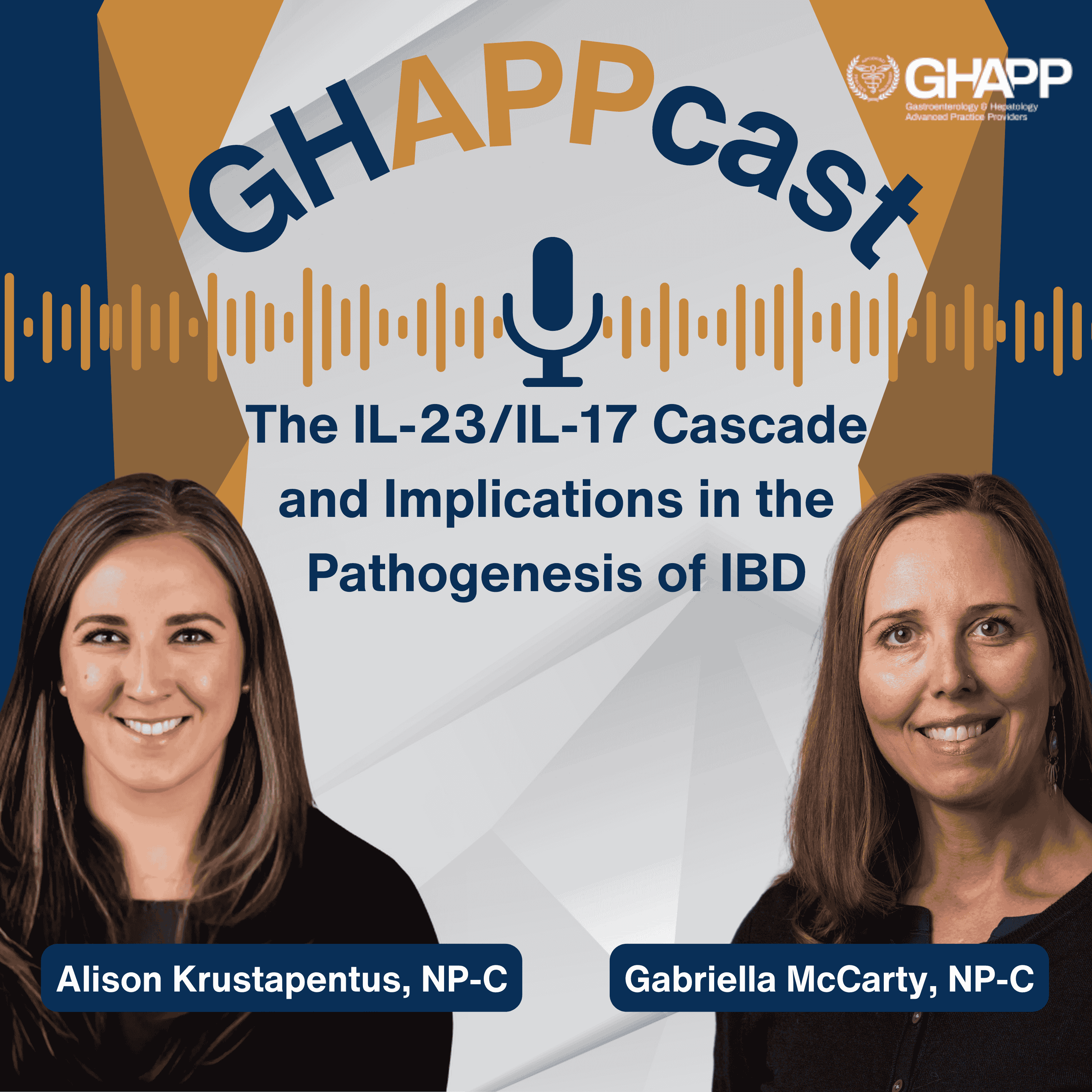 GHAPPcastGHAPPcast: The IL23/IL17 Cascade and Implications in the Pathogenesis of IBDThank you Johnson & Johnson for your support of this GHAPPcast episode. Welcome to GHAPPcast, the official podcast of Gastroenterology and Hepatology Advanced Practice Providers (GHAPP), where we delve into the latest advancements in GI and liver diseases. In this enlightening episode, host Gabriella McCarty, NP-C, from NorthShore Gastroenterology, explores the intricate role of the IL-23/IL-17 axis in inflammatory bowel disease (IBD). This discussion, supported by Johnson & Johnson, offers invaluable insights into how this immunological pathway influences IBD progression and how targeted therapies are shaping the future of treatment.Joining the conversation is Allison Krustapentus...2024-12-1212 min
GHAPPcastGHAPPcast: The IL23/IL17 Cascade and Implications in the Pathogenesis of IBDThank you Johnson & Johnson for your support of this GHAPPcast episode. Welcome to GHAPPcast, the official podcast of Gastroenterology and Hepatology Advanced Practice Providers (GHAPP), where we delve into the latest advancements in GI and liver diseases. In this enlightening episode, host Gabriella McCarty, NP-C, from NorthShore Gastroenterology, explores the intricate role of the IL-23/IL-17 axis in inflammatory bowel disease (IBD). This discussion, supported by Johnson & Johnson, offers invaluable insights into how this immunological pathway influences IBD progression and how targeted therapies are shaping the future of treatment.Joining the conversation is Allison Krustapentus...2024-12-1212 min GHAPPcastMedication Review: Describe the mechanism of action of guselkumabThank you Johnson & Johnson for your support of this Medication Review Video Module. In this medication review, Whitney Steinmetz, NP, from Presbyterian Medical Group in Albuquerque, New Mexico, explores the mechanism of action of Guselkumab, a promising monoclonal antibody therapy for inflammatory bowel disease (IBD), including ulcerative colitis (UC) and Crohn’s disease (CD).IBD is driven by chronic gastrointestinal inflammation, resulting from a complex interplay of genetic predisposition, environmental triggers, and immune system dysregulation. A crucial element in this inflammatory process is interleukin-23 (IL-23), a pro-inflammatory cytokine that promotes the differentiation, expansion, and survival of...2024-12-0502 min
GHAPPcastMedication Review: Describe the mechanism of action of guselkumabThank you Johnson & Johnson for your support of this Medication Review Video Module. In this medication review, Whitney Steinmetz, NP, from Presbyterian Medical Group in Albuquerque, New Mexico, explores the mechanism of action of Guselkumab, a promising monoclonal antibody therapy for inflammatory bowel disease (IBD), including ulcerative colitis (UC) and Crohn’s disease (CD).IBD is driven by chronic gastrointestinal inflammation, resulting from a complex interplay of genetic predisposition, environmental triggers, and immune system dysregulation. A crucial element in this inflammatory process is interleukin-23 (IL-23), a pro-inflammatory cytokine that promotes the differentiation, expansion, and survival of...2024-12-0502 min GHAPPcastFAQ: Define, compare, and contrast humoral and cell-mediated immunity.Thank you Johnson & Johnson for your support of this FAQ Video Module. In this FAQ video module, Erica Heagy, NP, from Alaska Digestive and Liver Disease, breaks down the key differences between humoral immunity and cell-mediated immunity, two crucial components of the adaptive immune system that protect the body from infections.Adaptive immunity is triggered when the body is exposed to antigens, allowing it to mount a targeted defense against viruses, bacteria, and toxins. Within this system, humoral and cell-mediated immunity function in distinct but complementary ways.Humoral immunity, also known as antibody-mediated...2024-12-0401 min
GHAPPcastFAQ: Define, compare, and contrast humoral and cell-mediated immunity.Thank you Johnson & Johnson for your support of this FAQ Video Module. In this FAQ video module, Erica Heagy, NP, from Alaska Digestive and Liver Disease, breaks down the key differences between humoral immunity and cell-mediated immunity, two crucial components of the adaptive immune system that protect the body from infections.Adaptive immunity is triggered when the body is exposed to antigens, allowing it to mount a targeted defense against viruses, bacteria, and toxins. Within this system, humoral and cell-mediated immunity function in distinct but complementary ways.Humoral immunity, also known as antibody-mediated...2024-12-0401 min GHAPPcastGHAPPcast - CSID in Adults: Clinical Pearls & the Patient JourneyLive from the GHAPP National 2024 Conference, Dr. Dakesh Patel, a gastroenterologist with the GI Alliance of Illinois, joins Kate Scarlata, MPH, RD, a nationally renowned dietitian and bestselling author, and Kaitlin Colella, PA, to discuss congenital sucrase-isomaltase deficiency (CSID), a frequently overlooked digestive disorder. CSID affects the body's ability to break down sugar and starch due to enzyme deficiencies, often leading to misdiagnosis as IBS. Many patients struggle for years with chronic bloating, diarrhea, constipation, and severe abdominal discomfort without realizing the root cause of their symptoms.In this insightful discussion, the experts explore the science behind...2024-11-1425 min
GHAPPcastGHAPPcast - CSID in Adults: Clinical Pearls & the Patient JourneyLive from the GHAPP National 2024 Conference, Dr. Dakesh Patel, a gastroenterologist with the GI Alliance of Illinois, joins Kate Scarlata, MPH, RD, a nationally renowned dietitian and bestselling author, and Kaitlin Colella, PA, to discuss congenital sucrase-isomaltase deficiency (CSID), a frequently overlooked digestive disorder. CSID affects the body's ability to break down sugar and starch due to enzyme deficiencies, often leading to misdiagnosis as IBS. Many patients struggle for years with chronic bloating, diarrhea, constipation, and severe abdominal discomfort without realizing the root cause of their symptoms.In this insightful discussion, the experts explore the science behind...2024-11-1425 min GHAPPcastGHAPP PBC Podcast Series Part 1: Prevalence, Awareness and Identification of PBCWelcome to Part 1 of our three-part miniseries on Primary Biliary Cholangitis (PBC), recorded live at GHAPP 2024! In this episode, Elizabeth Goacher, FNP (Duke University), Jeremy Davis, NP (Gastrointestinal Specialists, Louisiana), and Allison Moser, NP (Rush University Medical Center, Chicago) discuss the rising prevalence of PBC, increased awareness, and improved identification strategies in clinical practice.Although PBC is classified as a rare disease, its identification rates are increasing, thanks to better diagnostic tools, heightened primary care awareness, and expanded hepatology workups. Our experts explore whether this trend represents a true increase in prevalence or if improved screening and...2024-10-1803 min
GHAPPcastGHAPP PBC Podcast Series Part 1: Prevalence, Awareness and Identification of PBCWelcome to Part 1 of our three-part miniseries on Primary Biliary Cholangitis (PBC), recorded live at GHAPP 2024! In this episode, Elizabeth Goacher, FNP (Duke University), Jeremy Davis, NP (Gastrointestinal Specialists, Louisiana), and Allison Moser, NP (Rush University Medical Center, Chicago) discuss the rising prevalence of PBC, increased awareness, and improved identification strategies in clinical practice.Although PBC is classified as a rare disease, its identification rates are increasing, thanks to better diagnostic tools, heightened primary care awareness, and expanded hepatology workups. Our experts explore whether this trend represents a true increase in prevalence or if improved screening and...2024-10-1803 min GHAPPcastGHAPP PBC Podcast Series Part 2: New Therapeutics In The PBC SpaceWelcome back to Part 2 of our three-part Primary Biliary Cholangitis (PBC) miniseries, where we explore the latest advancements in PBC treatment and disease management. In this episode, Elizabeth Goacher, FNP, Jeremy Davis, NP, and Allison Moser, NP discuss new therapeutic options, including seladelpar and elafibranor, and how these emerging treatments are transforming the PBC landscape.With the approval of seladelpar and elafibranor, clinicians now have more tools to not only lower alkaline phosphatase (ALP) levels but also to improve cholestatic pruritus, a debilitating symptom that has long remained difficult to manage. Our experts share insights on how...2024-10-1805 min
GHAPPcastGHAPP PBC Podcast Series Part 2: New Therapeutics In The PBC SpaceWelcome back to Part 2 of our three-part Primary Biliary Cholangitis (PBC) miniseries, where we explore the latest advancements in PBC treatment and disease management. In this episode, Elizabeth Goacher, FNP, Jeremy Davis, NP, and Allison Moser, NP discuss new therapeutic options, including seladelpar and elafibranor, and how these emerging treatments are transforming the PBC landscape.With the approval of seladelpar and elafibranor, clinicians now have more tools to not only lower alkaline phosphatase (ALP) levels but also to improve cholestatic pruritus, a debilitating symptom that has long remained difficult to manage. Our experts share insights on how...2024-10-1805 min GHAPPcastGHAPP PBC Podcast Series Part 3: The Key Highlights of PBC at the GHAPP Conference 2024Welcome back to the final installment of our three-part miniseries on Primary Biliary Cholangitis (PBC) from the GHAPP National 2024 Conference! In this episode, Elizabeth Goacher, FNP, Jeremy Davis, NP, and Allison Moser, NP discuss the most impactful updates in PBC management, treatment goals, and evolving clinical strategies.A major highlight from this year’s meeting is the shifting treatment paradigm in PBC, moving beyond traditional Poise criteria to a more aggressive target of achieving completely normal alkaline phosphatase (ALKP) levels and a bilirubin of ≤0.6. Experts emphasize that new therapies, including seladelpar and elafibranor, are helping clinicians push trea...2024-10-1802 min
GHAPPcastGHAPP PBC Podcast Series Part 3: The Key Highlights of PBC at the GHAPP Conference 2024Welcome back to the final installment of our three-part miniseries on Primary Biliary Cholangitis (PBC) from the GHAPP National 2024 Conference! In this episode, Elizabeth Goacher, FNP, Jeremy Davis, NP, and Allison Moser, NP discuss the most impactful updates in PBC management, treatment goals, and evolving clinical strategies.A major highlight from this year’s meeting is the shifting treatment paradigm in PBC, moving beyond traditional Poise criteria to a more aggressive target of achieving completely normal alkaline phosphatase (ALKP) levels and a bilirubin of ≤0.6. Experts emphasize that new therapies, including seladelpar and elafibranor, are helping clinicians push trea...2024-10-1802 min GHAPPcastKOL Conversation: A New Treatment OptionLive from the GHAPP 2024 Conference in Washington, D.C., Dr. Renee Pozza, NP (Southern California GI & Liver Centers) and Allysa Saggese, NP (Weill Cornell Medicine, Manhattan) discuss the latest FDA-approved therapies for Primary Biliary Cholangitis (PBC) and how they fit into the evolving treatment landscape. With new medications offering both biochemical improvements and symptom relief, particularly for cholestatic pruritus, clinicians now have more options to personalize treatment plans. These second-line therapies can be used in addition to or as a replacement for ursodeoxycholic acid (UDCA) in cases of intolerance or inadequate response. The discussion also emphasizes the importance of...2024-10-1509 min
GHAPPcastKOL Conversation: A New Treatment OptionLive from the GHAPP 2024 Conference in Washington, D.C., Dr. Renee Pozza, NP (Southern California GI & Liver Centers) and Allysa Saggese, NP (Weill Cornell Medicine, Manhattan) discuss the latest FDA-approved therapies for Primary Biliary Cholangitis (PBC) and how they fit into the evolving treatment landscape. With new medications offering both biochemical improvements and symptom relief, particularly for cholestatic pruritus, clinicians now have more options to personalize treatment plans. These second-line therapies can be used in addition to or as a replacement for ursodeoxycholic acid (UDCA) in cases of intolerance or inadequate response. The discussion also emphasizes the importance of...2024-10-1509 min GHAPPcastKOL Conversation: New & Emerging Treatment Considerations for PBC & PBC PruritusIn this episode, Jordan Mayberry, PA-C from UT Southwestern Medical Center, discusses how newly approved therapies are transforming the management of cholestatic pruritus in Primary Biliary Cholangitis (PBC). With pruritus being one of the most challenging symptoms for PBC patients, these emerging treatments offer a targeted approach to improving patient quality of life.As PBC patients often struggle with persistent itching that significantly impacts daily activities, the availability of FDA-approved therapies specifically addressing PBC-related pruritus represents a major advancement. Jordan Mayberry emphasizes the importance of screening for PBC in patients experiencing chronic pruritus, as early diagnosis and...2024-10-1501 min
GHAPPcastKOL Conversation: New & Emerging Treatment Considerations for PBC & PBC PruritusIn this episode, Jordan Mayberry, PA-C from UT Southwestern Medical Center, discusses how newly approved therapies are transforming the management of cholestatic pruritus in Primary Biliary Cholangitis (PBC). With pruritus being one of the most challenging symptoms for PBC patients, these emerging treatments offer a targeted approach to improving patient quality of life.As PBC patients often struggle with persistent itching that significantly impacts daily activities, the availability of FDA-approved therapies specifically addressing PBC-related pruritus represents a major advancement. Jordan Mayberry emphasizes the importance of screening for PBC in patients experiencing chronic pruritus, as early diagnosis and...2024-10-1501 min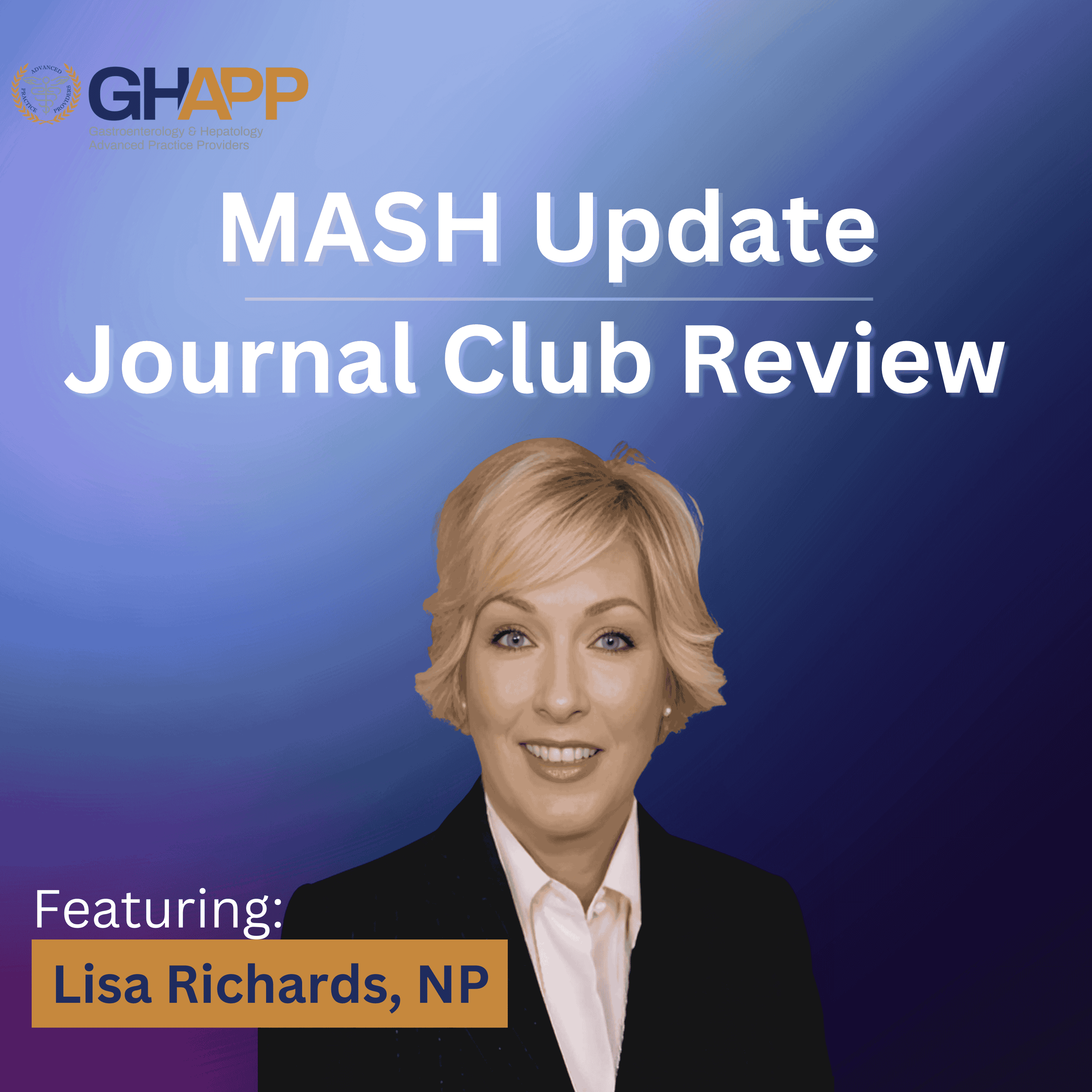 GHAPPcastJournal Club: A Phase 3, Randomized, Controlled Trial of Resmetirom in NASH with Liver FibrosisThank you Madrigal for your support of this Journal Club Video Module. In this Journal Club Video Module, Lisa Richards, NP, a hepatology specialist with over 20 years of experience at UC San Diego Health, presents the pivotal findings of the Phase 3 randomized controlled trial of Resmetirom for the treatment of Metabolic Dysfunction-Associated Steatohepatitis (MASH) with liver fibrosis. Published in The New England Journal of Medicine in February 2024, this study provided the data that led to FDA approval of Resmetirom in March 2024 for adults with moderate to advanced fibrosis (F2-F3) due to MASH.MASH, formerly...2024-10-0304 min
GHAPPcastJournal Club: A Phase 3, Randomized, Controlled Trial of Resmetirom in NASH with Liver FibrosisThank you Madrigal for your support of this Journal Club Video Module. In this Journal Club Video Module, Lisa Richards, NP, a hepatology specialist with over 20 years of experience at UC San Diego Health, presents the pivotal findings of the Phase 3 randomized controlled trial of Resmetirom for the treatment of Metabolic Dysfunction-Associated Steatohepatitis (MASH) with liver fibrosis. Published in The New England Journal of Medicine in February 2024, this study provided the data that led to FDA approval of Resmetirom in March 2024 for adults with moderate to advanced fibrosis (F2-F3) due to MASH.MASH, formerly...2024-10-0304 min GHAPPcastFAQ: What is MASH?Thank you Madrigal for your support of this FAQ Video Module. In this FAQ Video Module, Corrie Berk, NP, Director of Hepatology and Transplant Outreach Programs at the Texas Liver Institute, answers key questions about Metabolic Dysfunction-Associated Steatohepatitis (MASH)—a progressive liver disease that was previously known as Non-Alcoholic Steatohepatitis (NASH).MASH is the inflammatory form of Metabolic Dysfunction-Associated Steatotic Liver Disease (MASLD) and is caused by the buildup of excess fat in the liver in individuals who consume little to no alcohol. This condition can lead to liver inflammation, fibrosis, cirrhosis, and an increased ri...2024-10-0303 min
GHAPPcastFAQ: What is MASH?Thank you Madrigal for your support of this FAQ Video Module. In this FAQ Video Module, Corrie Berk, NP, Director of Hepatology and Transplant Outreach Programs at the Texas Liver Institute, answers key questions about Metabolic Dysfunction-Associated Steatohepatitis (MASH)—a progressive liver disease that was previously known as Non-Alcoholic Steatohepatitis (NASH).MASH is the inflammatory form of Metabolic Dysfunction-Associated Steatotic Liver Disease (MASLD) and is caused by the buildup of excess fat in the liver in individuals who consume little to no alcohol. This condition can lead to liver inflammation, fibrosis, cirrhosis, and an increased ri...2024-10-0303 min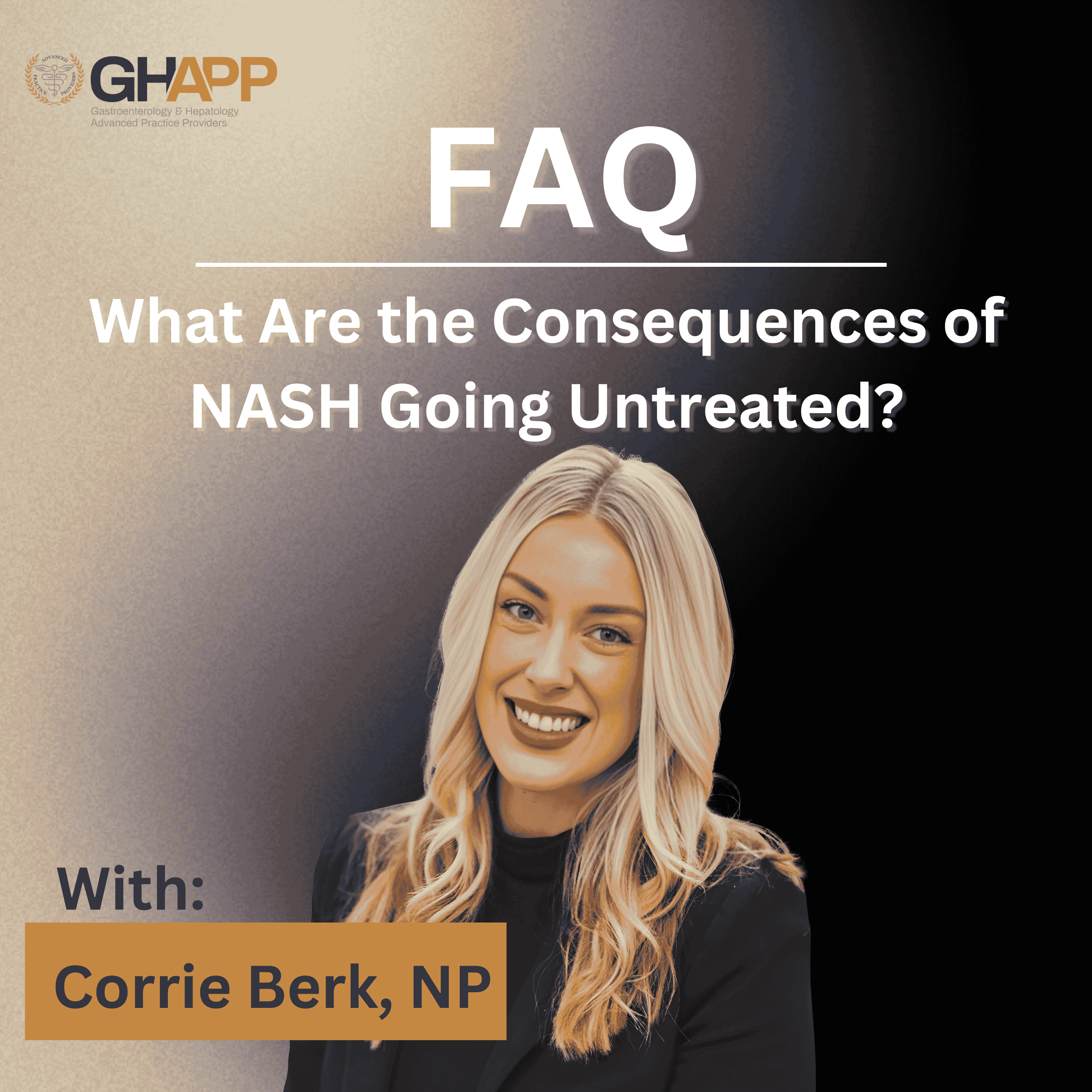 GHAPPcastFAQ: What are the consequences of MASH going untreated?Thank you Madrigal for your support of this FAQ Video Module. In this FAQ Video Module, Corrie Berk, NP, Director of Hepatology and Transplant Outreach Programs at the Texas Liver Institute, discusses the serious consequences of untreated Metabolic Dysfunction-Associated Steatohepatitis (MASH) and how Advanced Practice Providers (APPs) can play a crucial role in patient education and early intervention.MASH is often a silent liver disease, meaning symptoms may not appear until significant damage has occurred. If left untreated, MASH can progress to liver inflammation, fibrosis, cirrhosis, and even liver failure. Alarmingly, MASH is now the...2024-10-0303 min
GHAPPcastFAQ: What are the consequences of MASH going untreated?Thank you Madrigal for your support of this FAQ Video Module. In this FAQ Video Module, Corrie Berk, NP, Director of Hepatology and Transplant Outreach Programs at the Texas Liver Institute, discusses the serious consequences of untreated Metabolic Dysfunction-Associated Steatohepatitis (MASH) and how Advanced Practice Providers (APPs) can play a crucial role in patient education and early intervention.MASH is often a silent liver disease, meaning symptoms may not appear until significant damage has occurred. If left untreated, MASH can progress to liver inflammation, fibrosis, cirrhosis, and even liver failure. Alarmingly, MASH is now the...2024-10-0303 min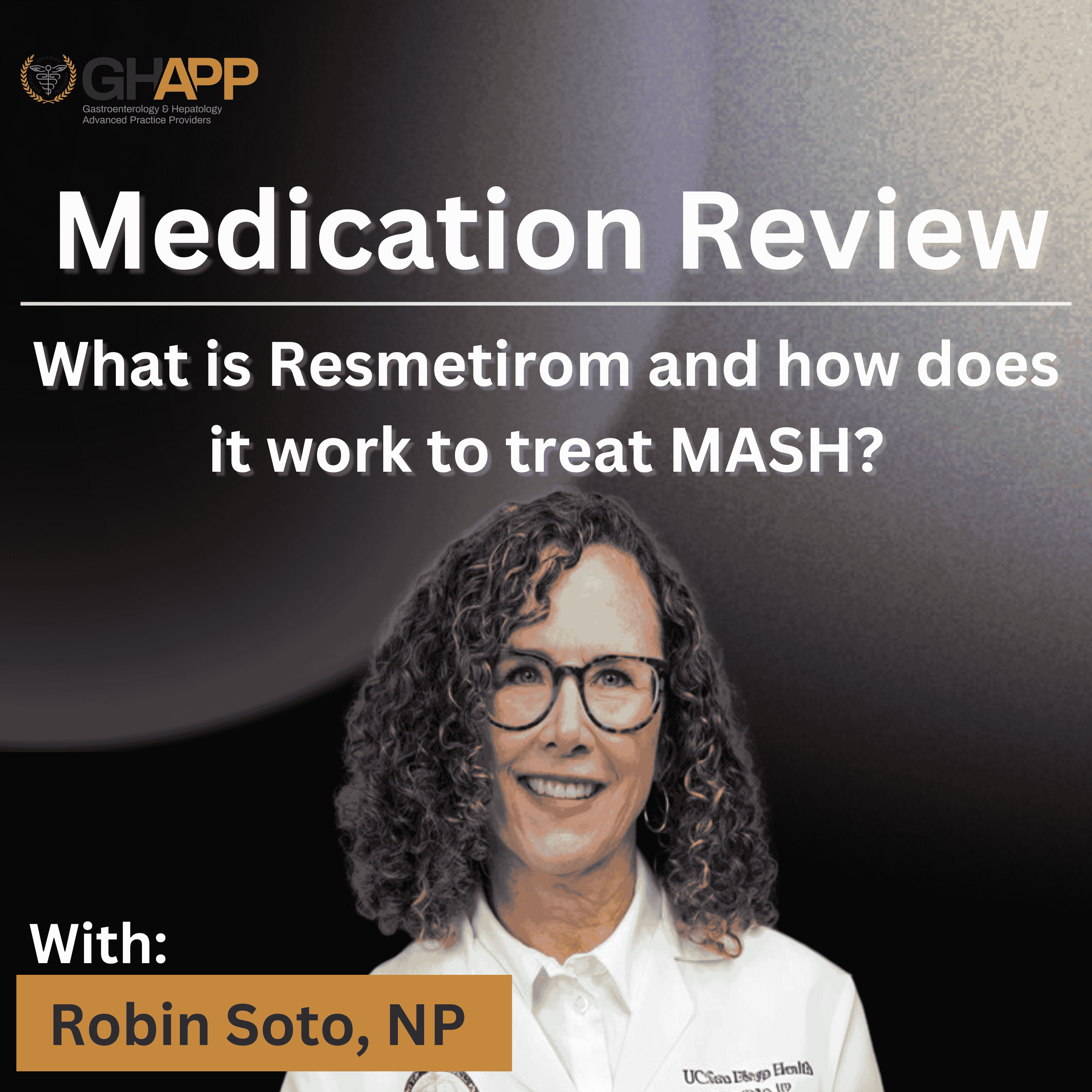 GHAPPcastMedication Review Video Module: What is Resmetirom and how does it work to treat MASH?Thank you Madrigal for your support of this Medication Review Video Module. In this Medication Review Video Module, Robin Soto, NP, from UC San Diego Health Hepatology, provides an in-depth look at the mechanism of action of Resmetirom, the first and only FDA-approved drug for the treatment of Metabolic Dysfunction-Associated Steatohepatitis (MASH) in adults with F2, F3, or mild to moderate fibrosis.Resmetirom is an oral, liver-directed, beta-selective thyroid hormone receptor agonist (THR-β agonist). In MASH, the accumulation of lipotoxic lipids leads to hepatocyte injury, inflammation, and hepatic stellate cell activation, resulting in progressive fibrosis a...2024-10-0302 min
GHAPPcastMedication Review Video Module: What is Resmetirom and how does it work to treat MASH?Thank you Madrigal for your support of this Medication Review Video Module. In this Medication Review Video Module, Robin Soto, NP, from UC San Diego Health Hepatology, provides an in-depth look at the mechanism of action of Resmetirom, the first and only FDA-approved drug for the treatment of Metabolic Dysfunction-Associated Steatohepatitis (MASH) in adults with F2, F3, or mild to moderate fibrosis.Resmetirom is an oral, liver-directed, beta-selective thyroid hormone receptor agonist (THR-β agonist). In MASH, the accumulation of lipotoxic lipids leads to hepatocyte injury, inflammation, and hepatic stellate cell activation, resulting in progressive fibrosis a...2024-10-0302 min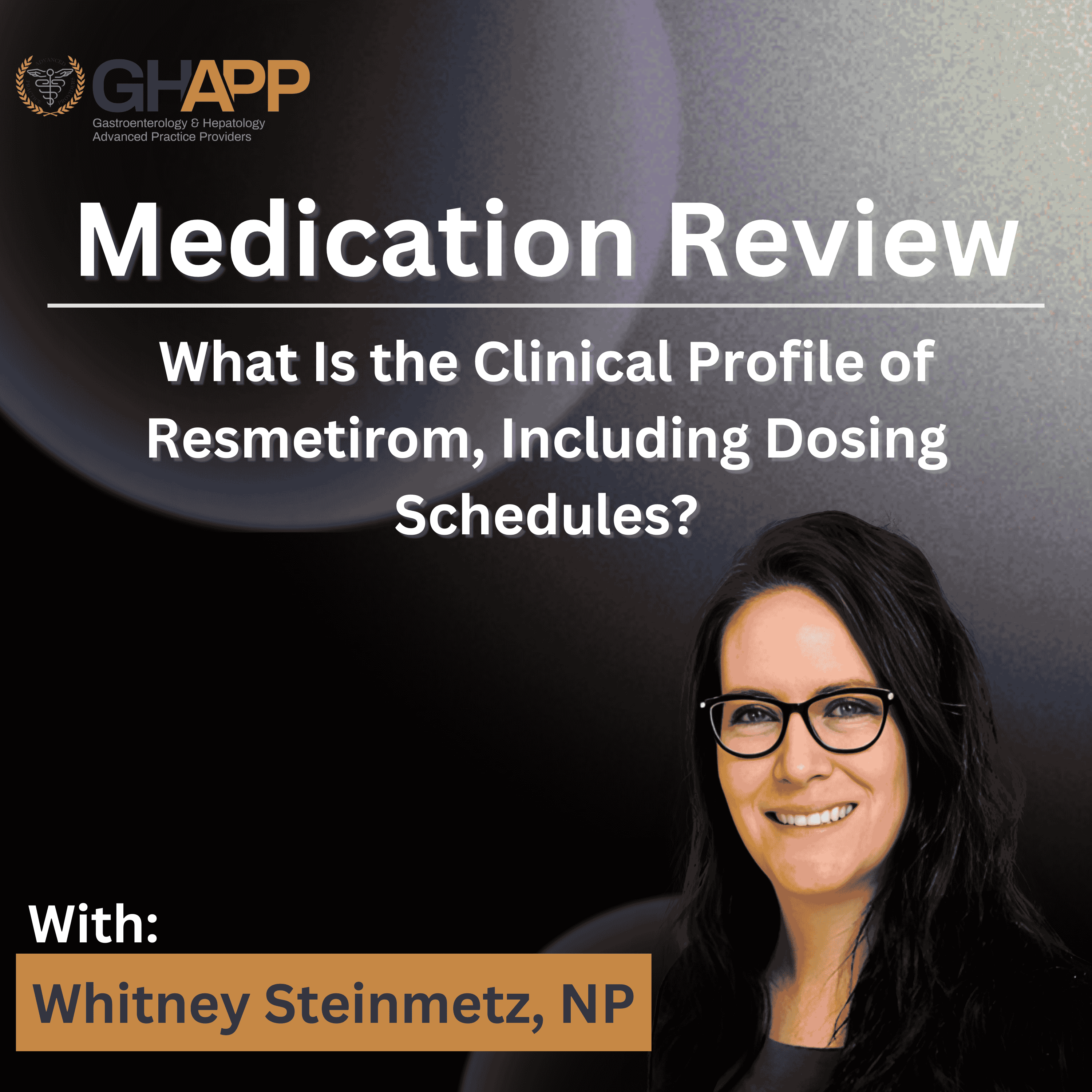 GHAPPcastMedication Review: What is the clinical profile of Resmetirom, including dosing schedules?Thank you Madrigal for your support of this Medication Review Video Module. In this Medication Review Video Module, Whitney Steinmetz, NP, provides an in-depth discussion on the clinical profile of Retam (Resd) for Metabolic-Associated Steatohepatitis (MASH) with moderate to advanced F2 or F3 fibrosis. While Retam is not currently FDA-approved for patients with cirrhosis, ongoing trials are evaluating its potential in this population.As a partial agonist of the thyroid hormone receptor beta, Retam targets hepatic metabolism, reducing intrahepatic triglycerides and improving liver health without significantly affecting thyroid hormone receptor alpha—which mediates effects on th...2024-10-0302 min
GHAPPcastMedication Review: What is the clinical profile of Resmetirom, including dosing schedules?Thank you Madrigal for your support of this Medication Review Video Module. In this Medication Review Video Module, Whitney Steinmetz, NP, provides an in-depth discussion on the clinical profile of Retam (Resd) for Metabolic-Associated Steatohepatitis (MASH) with moderate to advanced F2 or F3 fibrosis. While Retam is not currently FDA-approved for patients with cirrhosis, ongoing trials are evaluating its potential in this population.As a partial agonist of the thyroid hormone receptor beta, Retam targets hepatic metabolism, reducing intrahepatic triglycerides and improving liver health without significantly affecting thyroid hormone receptor alpha—which mediates effects on th...2024-10-0302 min GHAPPcastFAQ: How is MASH severity staged? What would an ideal MASH NIT algorithm look like?Thank you Madrigal for your support of this FAQ Video Module. In this FAQ Video Module, Jonathan Yeh, PA, from Columbia University Irving Medical Center, discusses the evolution of Metabolic Dysfunction-Associated Steatohepatitis (MASH) diagnosis and fibrosis staging. Formerly known as NASH, MASH was traditionally diagnosed through liver biopsy, but non-invasive testing (NITs) is now widely accepted for fibrosis assessment.Key non-invasive methods include FibroScan, which uses Vibration-Controlled Transient Elastography (VCTE), the Enhanced Liver Fibrosis (ELF) Test, and the FibroSure Blood Test. When used together, these tests provide a reliable assessment of fibrosis stage, significantly reducing...2024-10-0302 min
GHAPPcastFAQ: How is MASH severity staged? What would an ideal MASH NIT algorithm look like?Thank you Madrigal for your support of this FAQ Video Module. In this FAQ Video Module, Jonathan Yeh, PA, from Columbia University Irving Medical Center, discusses the evolution of Metabolic Dysfunction-Associated Steatohepatitis (MASH) diagnosis and fibrosis staging. Formerly known as NASH, MASH was traditionally diagnosed through liver biopsy, but non-invasive testing (NITs) is now widely accepted for fibrosis assessment.Key non-invasive methods include FibroScan, which uses Vibration-Controlled Transient Elastography (VCTE), the Enhanced Liver Fibrosis (ELF) Test, and the FibroSure Blood Test. When used together, these tests provide a reliable assessment of fibrosis stage, significantly reducing...2024-10-0302 min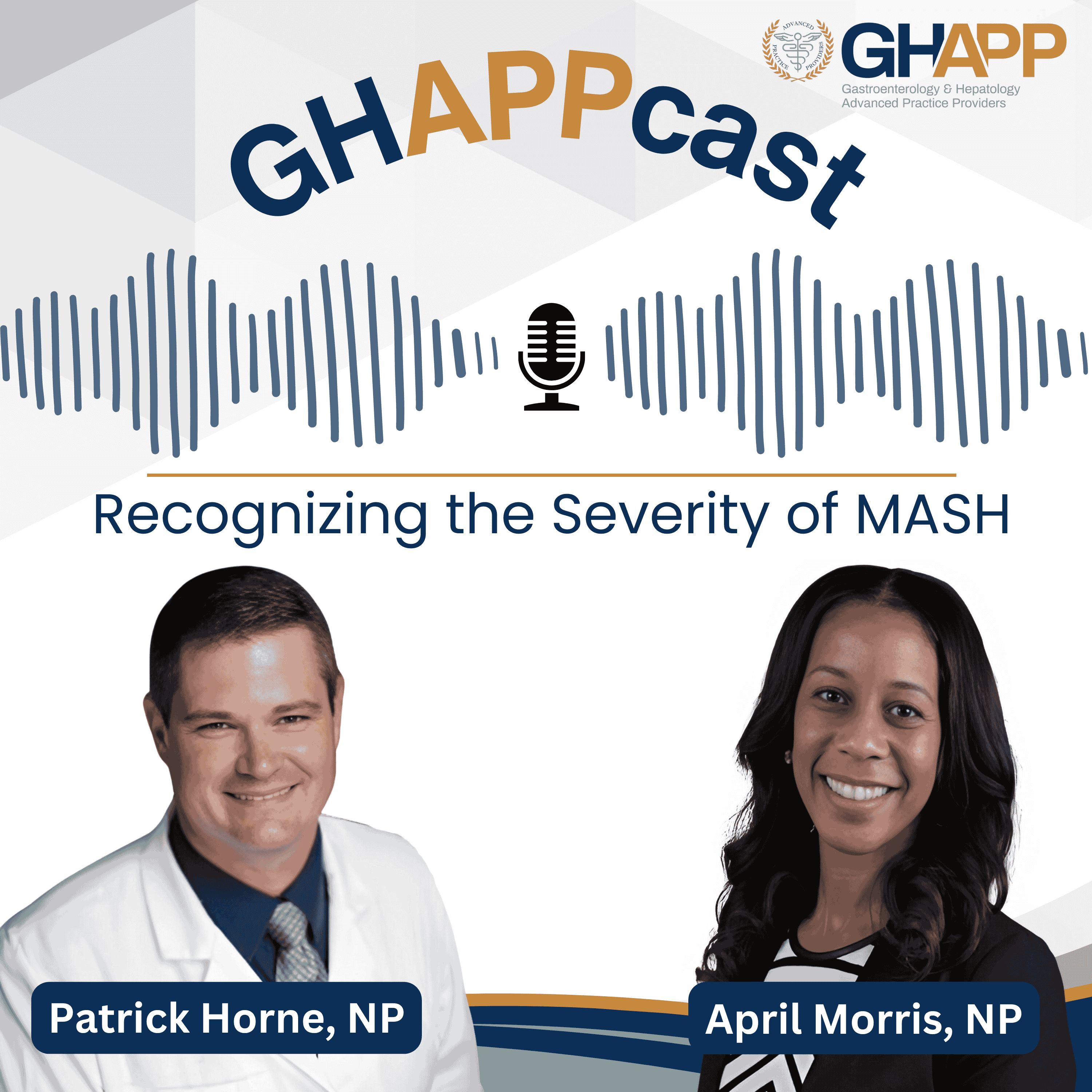 GHAPPcastGHAPPcast: Recognizing the Severity of MASHThank you Madrigal for your support of this GHAPPcast episode. In this GHAPPcast episode, Patrick Horne, NP, from the University of Florida, and April Morris, NP, from Richmond VA, discuss how to recognize the severity of MASH, identify at-risk patients, and implement early intervention strategies to prevent disease progression.MASH is strongly linked to metabolic dysfunction, making certain populations more vulnerable to developing the disease. Some of the key risk factors include type 2 diabetes, obesity, hypertension, and high cholesterol. Family history also plays a crucial role, as many patients with MASH have relatives who have...2024-10-0319 min
GHAPPcastGHAPPcast: Recognizing the Severity of MASHThank you Madrigal for your support of this GHAPPcast episode. In this GHAPPcast episode, Patrick Horne, NP, from the University of Florida, and April Morris, NP, from Richmond VA, discuss how to recognize the severity of MASH, identify at-risk patients, and implement early intervention strategies to prevent disease progression.MASH is strongly linked to metabolic dysfunction, making certain populations more vulnerable to developing the disease. Some of the key risk factors include type 2 diabetes, obesity, hypertension, and high cholesterol. Family history also plays a crucial role, as many patients with MASH have relatives who have...2024-10-0319 min GHAPPcastBest practices to accelerate the time to finding the right therapy for your patients with IBS-C?Thank you Ardelyx for your support of this FAQ Video Module. In this FAQ Video Module, Kim Orleck, PA-C, from Atlanta Gastroenterology Associates, discusses best practices to accelerate the process of identifying the right therapy for patients with Irritable Bowel Syndrome with Constipation (IBS-C). A timely and accurate diagnosis is the foundation for effective treatment, helping reduce unnecessary testing, lower financial burdens, and get patients on the right therapy as quickly as possible.One of the most significant advancements in managing IBS-C is the shift to a positive diagnostic strategy. Rather than relying on extensive...2024-09-1802 min
GHAPPcastBest practices to accelerate the time to finding the right therapy for your patients with IBS-C?Thank you Ardelyx for your support of this FAQ Video Module. In this FAQ Video Module, Kim Orleck, PA-C, from Atlanta Gastroenterology Associates, discusses best practices to accelerate the process of identifying the right therapy for patients with Irritable Bowel Syndrome with Constipation (IBS-C). A timely and accurate diagnosis is the foundation for effective treatment, helping reduce unnecessary testing, lower financial burdens, and get patients on the right therapy as quickly as possible.One of the most significant advancements in managing IBS-C is the shift to a positive diagnostic strategy. Rather than relying on extensive...2024-09-1802 min GHAPPcastFAQ: What does it mean for a biosimilar to be interchangeable and why is that important?Thank you Boehringer Ingelheim for your support of this FAQ Video Module. Join Tedra Gray, NP, as she dives into what it means for a biosimilar to be interchangeable. Interchangeability is a key designation in the world of biosimilars, ensuring that these medications can be substituted for their reference products at the pharmacy level without the need for prescriber approval. Only a select few biosimilars have earned interchangeability status, meaning they have undergone rigorous FDA evaluation to demonstrate that switching between the biosimilar and the reference product does not compromise safety, efficacy, or patient outcomes. This designation...2024-09-1702 min
GHAPPcastFAQ: What does it mean for a biosimilar to be interchangeable and why is that important?Thank you Boehringer Ingelheim for your support of this FAQ Video Module. Join Tedra Gray, NP, as she dives into what it means for a biosimilar to be interchangeable. Interchangeability is a key designation in the world of biosimilars, ensuring that these medications can be substituted for their reference products at the pharmacy level without the need for prescriber approval. Only a select few biosimilars have earned interchangeability status, meaning they have undergone rigorous FDA evaluation to demonstrate that switching between the biosimilar and the reference product does not compromise safety, efficacy, or patient outcomes. This designation...2024-09-1702 min GHAPPcastFAQ: What resources do you use to understand the latest approaches to managing IBS-C patients?Thank you Ardelyx for your support of this FAQ Video Module. In this FAQ Video Module, Kim Orleck, PA-C, from Atlanta Gastroenterology Associates, shares the most valuable resources for staying up to date on the latest approaches to managing IBS-C patients. As treatment strategies continue to evolve, leveraging evidence-based guidelines, professional conferences, industry expertise, and peer discussions can enhance patient care and optimize treatment outcomes.One of the most critical resources for managing IBS-C is clinical guidelines. Both the American College of Gastroenterology (ACG) and American Gastroenterological Association (AGA) guidelines offer comprehensive, evidence-based recommendations for...2024-09-1701 min
GHAPPcastFAQ: What resources do you use to understand the latest approaches to managing IBS-C patients?Thank you Ardelyx for your support of this FAQ Video Module. In this FAQ Video Module, Kim Orleck, PA-C, from Atlanta Gastroenterology Associates, shares the most valuable resources for staying up to date on the latest approaches to managing IBS-C patients. As treatment strategies continue to evolve, leveraging evidence-based guidelines, professional conferences, industry expertise, and peer discussions can enhance patient care and optimize treatment outcomes.One of the most critical resources for managing IBS-C is clinical guidelines. Both the American College of Gastroenterology (ACG) and American Gastroenterological Association (AGA) guidelines offer comprehensive, evidence-based recommendations for...2024-09-1701 min GHAPPcastFAQ: What are some best practices in determining clinically meaningful “response” to therapy for IBS-C patients?Thank you Ardelyx for your support of this FAQ Video Module. In this episode, Kim Orleck, PA-C, discusses key strategies for evaluating treatment response in patients with IBS-C (Irritable Bowel Syndrome with Constipation). With multiple therapeutic options now available, it is essential for providers to take a patient-centered approach to ensure meaningful symptom improvement and treatment satisfaction.A critical component of effective IBS-C management is setting realistic treatment goals and ensuring that both providers and patients align on expectations. Since bowel symptoms typically improve faster than pain and bloating, clinicians must educate patients on realistic...2024-09-1702 min
GHAPPcastFAQ: What are some best practices in determining clinically meaningful “response” to therapy for IBS-C patients?Thank you Ardelyx for your support of this FAQ Video Module. In this episode, Kim Orleck, PA-C, discusses key strategies for evaluating treatment response in patients with IBS-C (Irritable Bowel Syndrome with Constipation). With multiple therapeutic options now available, it is essential for providers to take a patient-centered approach to ensure meaningful symptom improvement and treatment satisfaction.A critical component of effective IBS-C management is setting realistic treatment goals and ensuring that both providers and patients align on expectations. Since bowel symptoms typically improve faster than pain and bloating, clinicians must educate patients on realistic...2024-09-1702 min GHAPPcastNavigating IBS: Pathophysiology, Neuromodulators, and Patient-Centered CareThank you Ardelyx for your support of this GHAPPcast episode. In this episode of GHAPPcast, the official podcast for Gastroenterology and Hepatology Advanced Practice Providers, host Christina Hanson, NP, is joined by Kim Kearns, NP, to explore the complex pathophysiology of IBS-C (Irritable Bowel Syndrome with Constipation) and the evolving neuromodulation strategies that enhance patient care.The discussion kicks off by addressing IBS as a disorder of gut-brain interaction (DGBI)—a paradigm shift from the older classification of functional GI disorders. The speakers dive deep into the physiological and neurological pathways that contribute to IBS sy...2024-09-1740 min
GHAPPcastNavigating IBS: Pathophysiology, Neuromodulators, and Patient-Centered CareThank you Ardelyx for your support of this GHAPPcast episode. In this episode of GHAPPcast, the official podcast for Gastroenterology and Hepatology Advanced Practice Providers, host Christina Hanson, NP, is joined by Kim Kearns, NP, to explore the complex pathophysiology of IBS-C (Irritable Bowel Syndrome with Constipation) and the evolving neuromodulation strategies that enhance patient care.The discussion kicks off by addressing IBS as a disorder of gut-brain interaction (DGBI)—a paradigm shift from the older classification of functional GI disorders. The speakers dive deep into the physiological and neurological pathways that contribute to IBS sy...2024-09-1740 min GHAPPcastBiosimilars and the Patient PerspectiveThank you Boehringer Ingelheim for your support of this podcast. Welcome to GHAPPcast, the official podcast for gastroenterology and hepatology advanced practice providers. Hosted by Gabriella McCarty, a nurse practitioner at NorthShore Gastroenterology in Cleveland, this episode dives into a crucial topic—biosimilars from a patient’s perspective. As a founding member of GHAPP and a provider with 25 years of experience in general GI, IBD, and hepatology, Gabriella is excited to explore the real-world impact of biosimilars through the eyes of a patient.In this episode, we welcome Emily, a Crohn’s disease patient who has fi...2024-09-1716 min
GHAPPcastBiosimilars and the Patient PerspectiveThank you Boehringer Ingelheim for your support of this podcast. Welcome to GHAPPcast, the official podcast for gastroenterology and hepatology advanced practice providers. Hosted by Gabriella McCarty, a nurse practitioner at NorthShore Gastroenterology in Cleveland, this episode dives into a crucial topic—biosimilars from a patient’s perspective. As a founding member of GHAPP and a provider with 25 years of experience in general GI, IBD, and hepatology, Gabriella is excited to explore the real-world impact of biosimilars through the eyes of a patient.In this episode, we welcome Emily, a Crohn’s disease patient who has fi...2024-09-1716 min GHAPPcastMastering IBS-C: Diagnostic Strategies, Differentiation, and Management.Thank you to Ardelyx for sponsoring this GHAPPcast episode! In this episode of GHAPPcast, host Christina Hanson, FNP, alongside guest Kim Orleck, PA-C, dives into advanced strategies for diagnosing and managing IBS-C. They discuss the importance of the positive diagnostic strategy, ways to differentiate IBS-C from other conditions, and share valuable insights on how to optimize patient care and treatment. Listeners will gain practical tips for effectively communicating with patients, setting realistic expectations, and making informed decisions on therapeutic options. Tune in to enhance your approach to managing IBS-C and stay up-to-date with the latest in GI a...2024-09-1038 min
GHAPPcastMastering IBS-C: Diagnostic Strategies, Differentiation, and Management.Thank you to Ardelyx for sponsoring this GHAPPcast episode! In this episode of GHAPPcast, host Christina Hanson, FNP, alongside guest Kim Orleck, PA-C, dives into advanced strategies for diagnosing and managing IBS-C. They discuss the importance of the positive diagnostic strategy, ways to differentiate IBS-C from other conditions, and share valuable insights on how to optimize patient care and treatment. Listeners will gain practical tips for effectively communicating with patients, setting realistic expectations, and making informed decisions on therapeutic options. Tune in to enhance your approach to managing IBS-C and stay up-to-date with the latest in GI a...2024-09-1038 min GHAPPcastFAQ: What is the Difference Between Biosimilars and Generics?Thank you Boehringer Ingelheim for your support of this FAQ Video Module. Join Tedra Gray, NP, as she explains how biosimilars and generics play a crucial role in modern medicine, especially in fields like gastroenterology, rheumatology, and dermatology. She explains the key differences between biosimilars and generic medications, helping both healthcare providers and patients make informed treatment decisions.Generic medications are identical copies of brand-name drugs, containing the same active ingredients, dosage, and route of administration. These drugs are FDA-approved and become available once the patent for the original brand-name drug expires. On the other...2024-09-0401 min
GHAPPcastFAQ: What is the Difference Between Biosimilars and Generics?Thank you Boehringer Ingelheim for your support of this FAQ Video Module. Join Tedra Gray, NP, as she explains how biosimilars and generics play a crucial role in modern medicine, especially in fields like gastroenterology, rheumatology, and dermatology. She explains the key differences between biosimilars and generic medications, helping both healthcare providers and patients make informed treatment decisions.Generic medications are identical copies of brand-name drugs, containing the same active ingredients, dosage, and route of administration. These drugs are FDA-approved and become available once the patent for the original brand-name drug expires. On the other...2024-09-0401 min GHAPPcastFAQ: What Role Does a New Mechanism of Action Play in Your Prescribing Decisions of IBS-C Therapy?Thank you Ardelyx for your support of this FAQ Video Module. For years, the primary treatment options for irritable bowel syndrome with constipation (IBS-C) have been limited to secretagogues, offering varying doses and tolerability. However, a new mechanism of action (MOA) is now available, revolutionizing treatment choices for healthcare providers and patients alike. In this discussion, Kim Orleck, PA-C, from Atlanta Gastroenterology Associates, explores the triple-action MOA of this novel IBS-C therapy and how it enhances clinical decision-making.This innovative therapy works by targeting the sodium-hydrogen exchanger isoform 3 (NHE3) on the apical surfaces of the...2024-08-2602 min
GHAPPcastFAQ: What Role Does a New Mechanism of Action Play in Your Prescribing Decisions of IBS-C Therapy?Thank you Ardelyx for your support of this FAQ Video Module. For years, the primary treatment options for irritable bowel syndrome with constipation (IBS-C) have been limited to secretagogues, offering varying doses and tolerability. However, a new mechanism of action (MOA) is now available, revolutionizing treatment choices for healthcare providers and patients alike. In this discussion, Kim Orleck, PA-C, from Atlanta Gastroenterology Associates, explores the triple-action MOA of this novel IBS-C therapy and how it enhances clinical decision-making.This innovative therapy works by targeting the sodium-hydrogen exchanger isoform 3 (NHE3) on the apical surfaces of the...2024-08-2602 min GHAPPcastBiosimilars Unveiled: Empowering APPs for Better Patient ConversationsThank you Boehringer Ingelheim for your support of this podcast. In this episode of GHAPPcast, the official podcast for Gastroenterology and Hepatology Advanced Practice Providers, host Gabriella McCarty, NP, is joined by Tedra Gray, NP, to explore the role of biosimilars in GI treatment. They dive into the differences between biosimilars and generics, the cost savings associated with biosimilars, their safety and efficacy, and strategies for effectively educating patients about making the switch. With insights into the FDA approval process, insurance challenges, and real-world clinical experience, this discussion provides essential guidance for APPs looking to enhance patient...2024-08-2119 min
GHAPPcastBiosimilars Unveiled: Empowering APPs for Better Patient ConversationsThank you Boehringer Ingelheim for your support of this podcast. In this episode of GHAPPcast, the official podcast for Gastroenterology and Hepatology Advanced Practice Providers, host Gabriella McCarty, NP, is joined by Tedra Gray, NP, to explore the role of biosimilars in GI treatment. They dive into the differences between biosimilars and generics, the cost savings associated with biosimilars, their safety and efficacy, and strategies for effectively educating patients about making the switch. With insights into the FDA approval process, insurance challenges, and real-world clinical experience, this discussion provides essential guidance for APPs looking to enhance patient...2024-08-2119 min GHAPPcastCLDF/GHAPP Roundtable Podcast Series: MASH with Nadege Gunn, MD, Elizabeth Goacher, PA, and Ann Moore, FNPJoin Dr. Nadege Gunn, from the 2024 Liver Connect Conference. In this special episode, she is joined by Elizabeth Coacher, PA, and Ann Moore, FNP, to discuss the management of NASH (Nonalcoholic Steatohepatitis), newly approved treatments, and the importance of clinical trials.They explore patient-centered care, lifestyle modifications, and non-invasive tests for identifying at-risk patients. Tune in for insights on balancing clinical trial participation with approved therapies, addressing patient access and equity, and the need for ongoing education in hepatology. This episode offers valuable information for healthcare providers committed to improving liver health. Don't miss this engaging and...2024-08-0526 min
GHAPPcastCLDF/GHAPP Roundtable Podcast Series: MASH with Nadege Gunn, MD, Elizabeth Goacher, PA, and Ann Moore, FNPJoin Dr. Nadege Gunn, from the 2024 Liver Connect Conference. In this special episode, she is joined by Elizabeth Coacher, PA, and Ann Moore, FNP, to discuss the management of NASH (Nonalcoholic Steatohepatitis), newly approved treatments, and the importance of clinical trials.They explore patient-centered care, lifestyle modifications, and non-invasive tests for identifying at-risk patients. Tune in for insights on balancing clinical trial participation with approved therapies, addressing patient access and equity, and the need for ongoing education in hepatology. This episode offers valuable information for healthcare providers committed to improving liver health. Don't miss this engaging and...2024-08-0526 min GHAPPcastDiscussing Biosimilars With PatientsIn our twelfth and final episode of the GHAPP & RhAPP biosimilar podcast series host Gabriella McCarty, NP, and guest Jamie Brogan, NP have an in-depth conversation about discussing biosimilars with patients.The learning objectives for this episode are to:Design methods to appropriately explain biosimilars to patientsAddress potential patient perceptions of biosimilarsDevise methods to combat the nocebo effect when discussing biosimilars with patientsExplain the potential benefits of biosimilars for patientsPlease take our evaluation regarding this podcast here: https://www.ghapp.org/biosimilars-podcast-eval2023-12-1326 min
GHAPPcastDiscussing Biosimilars With PatientsIn our twelfth and final episode of the GHAPP & RhAPP biosimilar podcast series host Gabriella McCarty, NP, and guest Jamie Brogan, NP have an in-depth conversation about discussing biosimilars with patients.The learning objectives for this episode are to:Design methods to appropriately explain biosimilars to patientsAddress potential patient perceptions of biosimilarsDevise methods to combat the nocebo effect when discussing biosimilars with patientsExplain the potential benefits of biosimilars for patientsPlease take our evaluation regarding this podcast here: https://www.ghapp.org/biosimilars-podcast-eval2023-12-1326 min GHAPPcastThe Nocebo EffectWelcome to our eleventh episode of the GHAPP & RhAPP biosimilar podcast series! In the penultimate episode host Amanda Mixon, PA-C has an in-depth conversation with the incredible Naomi A. Amudala, CRNP, MSN, about The Nocebo Effect.The learning objectives and goals for this episode are to:Define the nocebo effectAppraise nocebo effect research as it pertains to biosimilarsExplain effective ways to counter the nocebo effect such as patient counselingPlease take our evaluation regarding this podcast here: https://www.ghapp.org/biosimilars-podcast-eval2023-12-0820 min
GHAPPcastThe Nocebo EffectWelcome to our eleventh episode of the GHAPP & RhAPP biosimilar podcast series! In the penultimate episode host Amanda Mixon, PA-C has an in-depth conversation with the incredible Naomi A. Amudala, CRNP, MSN, about The Nocebo Effect.The learning objectives and goals for this episode are to:Define the nocebo effectAppraise nocebo effect research as it pertains to biosimilarsExplain effective ways to counter the nocebo effect such as patient counselingPlease take our evaluation regarding this podcast here: https://www.ghapp.org/biosimilars-podcast-eval2023-12-0820 min GHAPPcastThe Practical Use of Biosimilars in Gastroenterology APP PracticeIn the tenth episode of the GHAPP & RhAPP biosimilar podcast series host Gabriella McCarty, NP-C, and guest Sharon Dudley-Brown PHD, FNP-BC, FAAN, FAANP discuss the practical use of biosimilars in Gastroenterology APP practice.The learning objectives for this episode are to:Interpret the AGA Biosimilars Roundtable meeting report and the Crohn’s & Colitis Foundation Biosimilar position statementDiscuss the use of biosimilars in the treatment of gastrointestinal diseasesProduce strategies for implementing the use of biosimilars in gastroenterology practicePlease take our evaluation regarding this podcast here: https://www.ghapp.org/biosimilars-podcast-eval2023-11-0822 min
GHAPPcastThe Practical Use of Biosimilars in Gastroenterology APP PracticeIn the tenth episode of the GHAPP & RhAPP biosimilar podcast series host Gabriella McCarty, NP-C, and guest Sharon Dudley-Brown PHD, FNP-BC, FAAN, FAANP discuss the practical use of biosimilars in Gastroenterology APP practice.The learning objectives for this episode are to:Interpret the AGA Biosimilars Roundtable meeting report and the Crohn’s & Colitis Foundation Biosimilar position statementDiscuss the use of biosimilars in the treatment of gastrointestinal diseasesProduce strategies for implementing the use of biosimilars in gastroenterology practicePlease take our evaluation regarding this podcast here: https://www.ghapp.org/biosimilars-podcast-eval2023-11-0822 min GHAPPcastThe Practical Use of Biosimilars in Rheumatology APP PracticeIn the ninth episode of the GHAPP & RhAPP biosimilar podcast series host Amanda Mixon, PA-C, and guest Daric Mueller, PA-C discuss the practical use of biosimilars in rheumatology APP practice.The learning objectives for this episode are to:Interpret the ACR white paper on biosimilars in rheumatologyDiscuss the use of biosimilars in the treatment of rheumatic diseasesProduce strategies for implementing the use of biosimilars in rheumatology practicePlease take our evaluation regarding this podcast here: https://www.ghapp.org/biosimilars-podcast-eval2023-10-3022 min
GHAPPcastThe Practical Use of Biosimilars in Rheumatology APP PracticeIn the ninth episode of the GHAPP & RhAPP biosimilar podcast series host Amanda Mixon, PA-C, and guest Daric Mueller, PA-C discuss the practical use of biosimilars in rheumatology APP practice.The learning objectives for this episode are to:Interpret the ACR white paper on biosimilars in rheumatologyDiscuss the use of biosimilars in the treatment of rheumatic diseasesProduce strategies for implementing the use of biosimilars in rheumatology practicePlease take our evaluation regarding this podcast here: https://www.ghapp.org/biosimilars-podcast-eval2023-10-3022 min GHAPPcastThe Benefits of BiosimilarsIn our eighth episode of the GHAPP & RhAPP biosimilar podcast series host Gabriella McCarty, NP, and guest Gwen Cassidy, NP review the benefits of biosimilars.The learning objectives for this episode are to:Outline the cost savings of biosimilars for patientsSummarize the cost savings for healthcare organizationsDiscuss healthcare providers feeling the pressure and burden of rising costs and how biosimilars may help in bridging the transition from volume-based to value-based carePlease take our evaluation regarding this podcast here: https://www.ghapp.org/biosimilars-podcast-eval2023-10-1119 min
GHAPPcastThe Benefits of BiosimilarsIn our eighth episode of the GHAPP & RhAPP biosimilar podcast series host Gabriella McCarty, NP, and guest Gwen Cassidy, NP review the benefits of biosimilars.The learning objectives for this episode are to:Outline the cost savings of biosimilars for patientsSummarize the cost savings for healthcare organizationsDiscuss healthcare providers feeling the pressure and burden of rising costs and how biosimilars may help in bridging the transition from volume-based to value-based carePlease take our evaluation regarding this podcast here: https://www.ghapp.org/biosimilars-podcast-eval2023-10-1119 min GHAPPcastManaged Care and BiosimilarsIn the seventh episode of the GHAPP & RhAPP biosimilar podcast series host Amanda Mixon, PA-C, and guest Audrey Gibson, PA-C discuss the interplay between managed care and biosimilars.The learning objectives for this episode are to:Discuss managed care implications for biosimilars reaching the marketIdentify the benefits of biosimilars in managed careFormulate strategies managed care professionals can employ to establish clinical pathways and increase biosimilar uptake in practicePlease take our evaluation regarding this podcast here: https://www.ghapp.org/biosimilars-podcast-eval2023-10-0324 min
GHAPPcastManaged Care and BiosimilarsIn the seventh episode of the GHAPP & RhAPP biosimilar podcast series host Amanda Mixon, PA-C, and guest Audrey Gibson, PA-C discuss the interplay between managed care and biosimilars.The learning objectives for this episode are to:Discuss managed care implications for biosimilars reaching the marketIdentify the benefits of biosimilars in managed careFormulate strategies managed care professionals can employ to establish clinical pathways and increase biosimilar uptake in practicePlease take our evaluation regarding this podcast here: https://www.ghapp.org/biosimilars-podcast-eval2023-10-0324 min GHAPPcastInterchangeability & Switching of BiosimilarsFor our sixth episode of the GHAPP & RhAPP biosimilar podcast series host Gabriella McCarty, NP-C, and guest Janette Villalon, NP discuss interchangeability & switching of biosimilars.The learning objectives and goals for this episode are to:-Define interchangeability-Illustrate the required info for a biosimilar to be deemed interchangeable by the FDA-Recognize how interchangeability studies are conducted-Analyze what interchangeability and switching mean for: -APPs -Pharmacists -PatientsPlease take our evaluation regarding this podcast here: https://www.ghapp.org/biosimilars-podcast-eval2023-09-1531 min
GHAPPcastInterchangeability & Switching of BiosimilarsFor our sixth episode of the GHAPP & RhAPP biosimilar podcast series host Gabriella McCarty, NP-C, and guest Janette Villalon, NP discuss interchangeability & switching of biosimilars.The learning objectives and goals for this episode are to:-Define interchangeability-Illustrate the required info for a biosimilar to be deemed interchangeable by the FDA-Recognize how interchangeability studies are conducted-Analyze what interchangeability and switching mean for: -APPs -Pharmacists -PatientsPlease take our evaluation regarding this podcast here: https://www.ghapp.org/biosimilars-podcast-eval2023-09-1531 min GHAPPcastBiosimilar ExtrapolationIn the fifth episode of the GHAPP & RhAPP biosimilar podcast series host Amanda Mixon, PA-C, and guest Betsy Kirchner, DNP review the important concept of biosimilar extrapolation.The learning objectives for this episode are to:Define extrapolationUnderstand why extrapolation is important.Understand the key aspects that may be considered for scientific justification of extrapolation including: -MOA in each condition -Pharmacokinetics and biodistribution -Expected toxicities -Other- concomitant medications/comorbiditiesPlease take our evaluation regarding this podcast here: https://www.ghapp.org/biosimilars-podcast-eval2023-08-2333 min
GHAPPcastBiosimilar ExtrapolationIn the fifth episode of the GHAPP & RhAPP biosimilar podcast series host Amanda Mixon, PA-C, and guest Betsy Kirchner, DNP review the important concept of biosimilar extrapolation.The learning objectives for this episode are to:Define extrapolationUnderstand why extrapolation is important.Understand the key aspects that may be considered for scientific justification of extrapolation including: -MOA in each condition -Pharmacokinetics and biodistribution -Expected toxicities -Other- concomitant medications/comorbiditiesPlease take our evaluation regarding this podcast here: https://www.ghapp.org/biosimilars-podcast-eval2023-08-2333 min